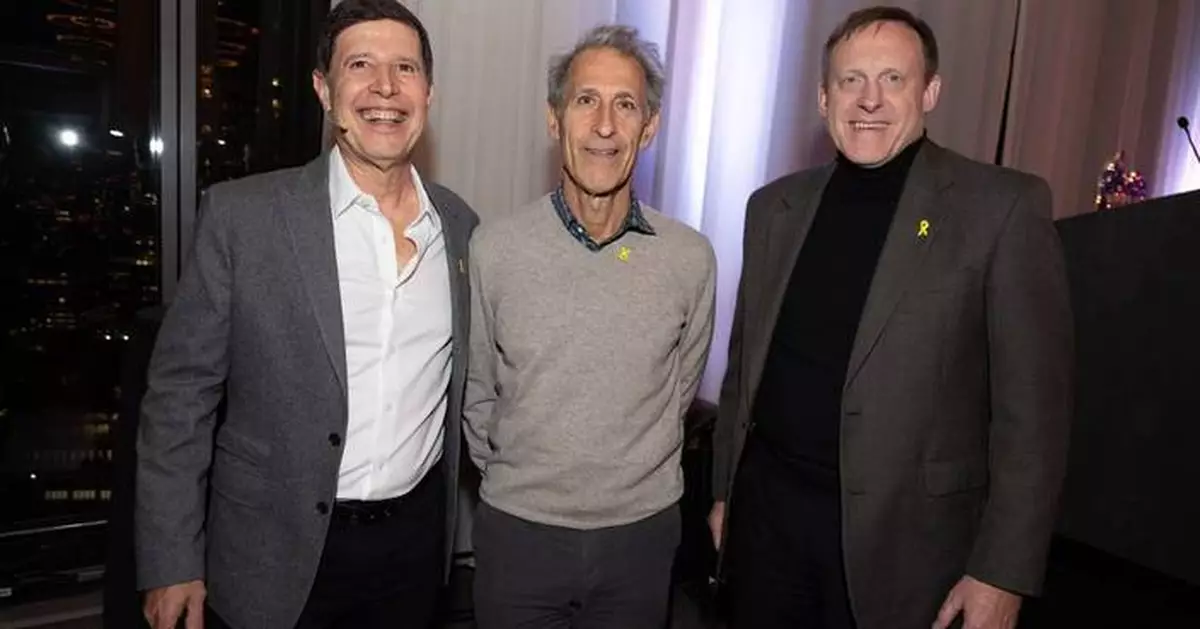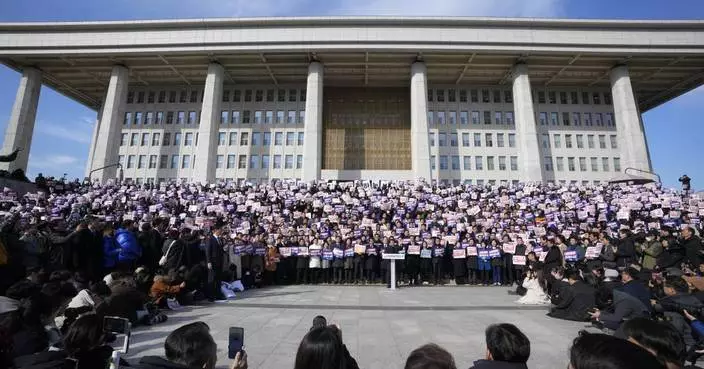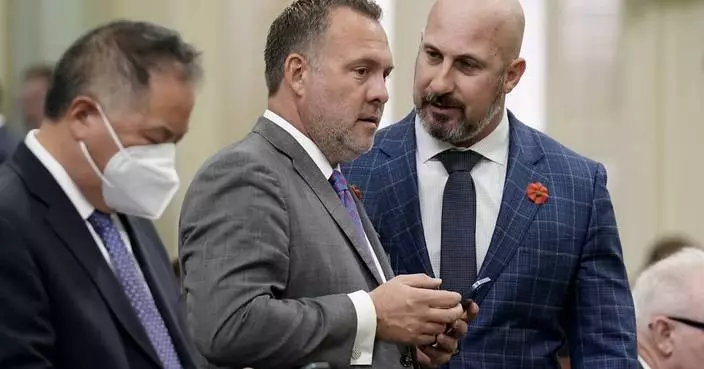NEW YORK--(BUSINESS WIRE)--Dec 3, 2024--
Team8, the global fund investing in cybersecurity, data, AI, fintech, and digital health, along with their intersections, recently hosted a week of impactful events in New York City. The program kicked off with the highly anticipated Rethink series. The series, designed to address critical shifts and challenges across industries, served as the opening event for Team8’s annual LP meeting. The week then culminated with the inaugural Team8 Fintech Village event, hosted at the New York Stock Exchange.
This press release features multimedia. View the full release here: https://www.businesswire.com/news/home/20241203729108/en/
This year's ‘Rethink AI’ event opened with an exclusive fireside chat between Michael Lynton, Chairman of Snap Inc. and Warner Music Group, and former CEO of Sony Pictures, and Adm. Mike Rogers, former Director of the NSA and Team8 partner. In their first joint appearance on the topic, Lynton and Rogers discussed the 2014 Sony cyberattack, an incident that transformed crisis management in the digital age. Lynton shared, “The Sony hack was a wake-up call to the dangers of cyber threats. No matter how robust a system is, I have yet to see a lock or safe that someone, somewhere, hasn't been able to break into,” reflecting on how the Sony attack shaped his approach to security.He also noted how AI has made enterprises rethink security even further. Speaking on AI, Lynton added, “AI is much like the early internet – embedding itself into our lives before we’ve set the right guardrails,” while Rogers offered his national security perspective, underscoring how AI-driven threats demand more adaptive, proactive strategies.
Following Rethink, Team8 hosted its annual LP meeting bringing together Team8’s limited partners, portfolio companies, and senior leaders to discuss the fund's performance, priorities, and objectives for the years to come. The LP meeting also featured speakers including Greg Ulrich, Chief AI and Data Officer at Mastercard; David Sabow, Head of Innovation Banking at HSBC. During the meeting, Yuval Shachar, Executive Chairman and Managing Partner at Team8 announced that Team8 is building an ‘AI Excellence Center’ as part of its operating team to develop in-house tools to enhance its platform capabilities.
The week’s events concluded with the inaugural Fintech Village at the NYSE, showcasing transformative solutions that address fintech's most pressing challenges. This exclusive event was supported by a prestigious roster of partners and sponsors, including Canapi Ventures, Deloitte Catalyst, Amazon Web Services (AWS), HSBC Innovation Banking, NYSE, Fintech Meetup, GUTS, Harel Innovation Hub, and Wilson Sonsini Goodrich & Rosati.
Speaking on the events of the week, Team8 Executive Chairman Yuval Shachar added, “2024 has been a milestone year for Team8 as we’ve expanded our portfolio, raised $500M in new funds, and celebrated several significant exits, all amidst unprecedented challenges. These events in New York underscore the strength and breadth of Team8 model and commitment to innovation.”
About Team8
Team8 is a global Venture-Creation and Venture Capital Fund that creates and invests in companies focusing on Cybersecurity, Data & AI, Fintech, and Digital Health. Team8’s signature Venture-Creation model is designed to identify meaningful problems, create theses on potential solutions, and build and invest in innovative companies that tackle these challenges.


Left to Right: Yuval Shachar, Team8 Executive Chairman, Michael Lynton, Chairman of Snap Inc, Adm. Mike Rogers, Former NSA Director and Team8 Operating Partner (Credit: Nir Arieli)
SEOUL, South Korea (AP) — South Korea’s opposition parties Wednesday submitted a motion to impeach President Yoon Suk Yeol over the shocking and short-lived martial law that drew heavily armed troops to encircle parliament before lawmakers climbed walls to reenter the building and unanimously voted to lift his order.
Impeaching Yoon would require the support of two-thirds of parliament and at least six justices of the nine-member Constitutional Court would have to support it to remove him from office. The motion, submitted jointly by the main opposition Democratic Party and five smaller opposition parties, could be put to a vote as early as Friday.
Yoon’s senior advisers and secretaries offered to resign collectively and his Cabinet members, including Defense Minister Kim Yong Hyun, were also facing calls to step down, as the nation struggled to make sense of what appeared to be a poorly-thought-out stunt.
In his speech announcing the abrupt order Tuesday night, Yoon vowed to eliminate “anti-state” forces and continued to criticize parliament’s attempts to impeach key government officials and senior prosecutors. But martial law lasted only about six hours, as the National Assembly voted to overrule Yoon and the declaration was formally lifted around 4:30 a.m. during a Cabinet meeting.
The liberal opposition Democratic Party, which holds a majority in the 300-seat parliament, said Wednesday that its lawmakers decided to call on Yoon to quit immediately or they would take steps to impeach him.
“President Yoon Suk Yeol’s martial law declaration was a clear violation of the constitution. It didn’t abide by any requirements to declare it,” the Democratic Party said in a statement. “His martial law declaration was originally invalid and a grave violation of the constitution. It was a grave act of rebellion and provides perfect grounds for his impeachment.”
Impeaching him would require support from 200 of the National Assembly's 300 members. The Democratic Party and other small opposition parties together have 192 seats. But the rejection of Yoon’s martial law declaration in a 190-0 vote included the votes of 18 lawmakers from Yoon’s ruling People Power Party, according to National Assembly officials.
The leader of the People Power Party, Han Dong-hun, who has long ties with Yoon dating to their days as prosecutors, criticized Yoon’s martial law declaration as “unconstitutional.”
Seoul Mayor Oh Se-hoon, seen as a potential presidential hopeful for the People Power Party, said Yoon’s martial law declaration went against the “fundamental spirit of democracy” and that the deployment of troops to the National Assembly was an act that violated the separation of powers.
“Right now, the most urgent task is a thorough investigation. Through this, we must clearly hold accountable those who participated in destroying democracy,” Oh said in a televised statement.
If Yoon is impeached, he’ll be stripped of his constitutional powers until the Constitutional Court rules. Prime Minister Han Duck-soo, the No. 2 position in the South Korean government, would take over his presidential responsibilities. As calls mounted for Yoon’s Cabinet to resign, Han issued a public message pleading for patience and calling for Cabinet members to “fulfill your duties even after this moment.”
The Constitutional Court has only six justices following three retirements, which is one below the minimum seven needed to handle a presidential impeachment case, requiring lawmakers to speed up the process of naming new justices.
Yoon’s martial law declaration, the first of its kind in more than 40 years, harkened to South Korea’s past military-backed governments when authorities occasionally proclaimed martial law and other decrees that allowed them to station combat soldiers, tanks and armored vehicles on streets or at public places like schools to prevent anti-government demonstrations. Such scenes of military intervention had not been seen since South Korea achieved a genuine democracy in the late 1980s until Tuesday night.
After Yoon’s declaration, troops carrying full battle gear, including assault rifles, tried to keep protesters away from the National Assembly as military helicopters flew overhead and landed nearby. One soldier pointed his assault rifle at a woman who was among protesters outside the building demanding that the martial law be lifted.
It wasn’t clear how the 190 lawmakers were able to enter a parliamentary hall to vote down Yoon’s martial law decree. Opposition leader Lee Jae-myung livestreamed himself climbing over the wall, and while troops and police officers blocked some from entering they didn’t aggressively restrain or use force against others.
No major violence has been reported. The troops and police personnel were later seen leaving the grounds of the National Assembly after the parliamentary vote to lift the martial law. National Assembly Speaker Woo Won Shik said: “Even with our unfortunate memories of military coups, our citizens have surely observed the events of today and saw the maturity of our military.”
Han, the People Power Party leader, demanded that Yoon explain his decision and fire Defense Minister Kim Yong Hyun, who he said recommended the martial law decree to Yoon. The Defense Ministry has not commented.
Under South Korea’s constitution, the president can declare martial law during “wartime, war-like situations or other comparable national emergency states” that require the use of military force to restrict the freedom of press, assembly and other rights to maintain order. Many observers question whether South Korea is currently in such a state.
The constitution also states that the president must oblige when the National Assembly demands the lifting of martial law with a majority vote.
Some experts say Yoon clearly violated the constitution in how he imposed martial law. While martial law allows “special measures” to restrict individual freedoms and the authority of agencies and courts, the constitution does not permit the functions of parliament to be restricted. But in following Yoon’s declaration on Tuesday, South Korea’s military proclaimed parliamentary activities were suspended and deployed troops to try to block lawmakers from entering the National Assembly.
Park Chan-dae, the Democratic Party’s floor leader, called for Yoon to be immediately investigated on charges of rebellion over the way he deployed troops to the parliament. While the president mostly enjoys immunity from prosecution while in office, the protection does not extend to alleged rebellion or treason.
In Washington, the White House said the U.S. was “seriously concerned” by the events in Seoul. A spokesperson for the National Security Council said President Joe Biden’s administration was not notified in advance of the martial law announcement and was in contact with the South Korean government.
Pentagon spokesman Maj. Gen. Pat Ryder said there was no effect on the more than 27,000 U.S. service members based in South Korea.
In Seoul, the streets seemed busy like a normal day Wednesday.
Tourist Stephen Rowan, from Brisbane, Australia, who was touring Gyeongbokgung Palace, said he was not concerned at all.
“But then again, I don’t understand too much about the political status in Korea,” he said. “But I hear they are now calling for the current president’s resignation, so ... apparently there’s going to be a lot of demonstrations. ... I would have been concerned if martial law had stayed enforced.”
Yoon’s government and ruling party have been embroiled in an impasse with the Democratic Party over next year’s budget bill and a Democratic Party-led attempt to to impeach three top prosecutors.
Natalia Slavney, research analyst at the Stimson Center’s 38 North website that focuses on Korean affairs, said Yoon’s imposition of martial law was “a serious backslide of democracy” that followed a “worrying trend of abuse” since he took office in 2022.
South Korea “has a robust history of political pluralism and is no stranger to mass protests and swift impeachments,” Slavney said, citing the example of former President Park Geun-hye, who was removed from office and imprisoned for bribery and other crimes in 2017. She was later pardoned.
Associated Press writer Jennifer McDermott contributed to this report.
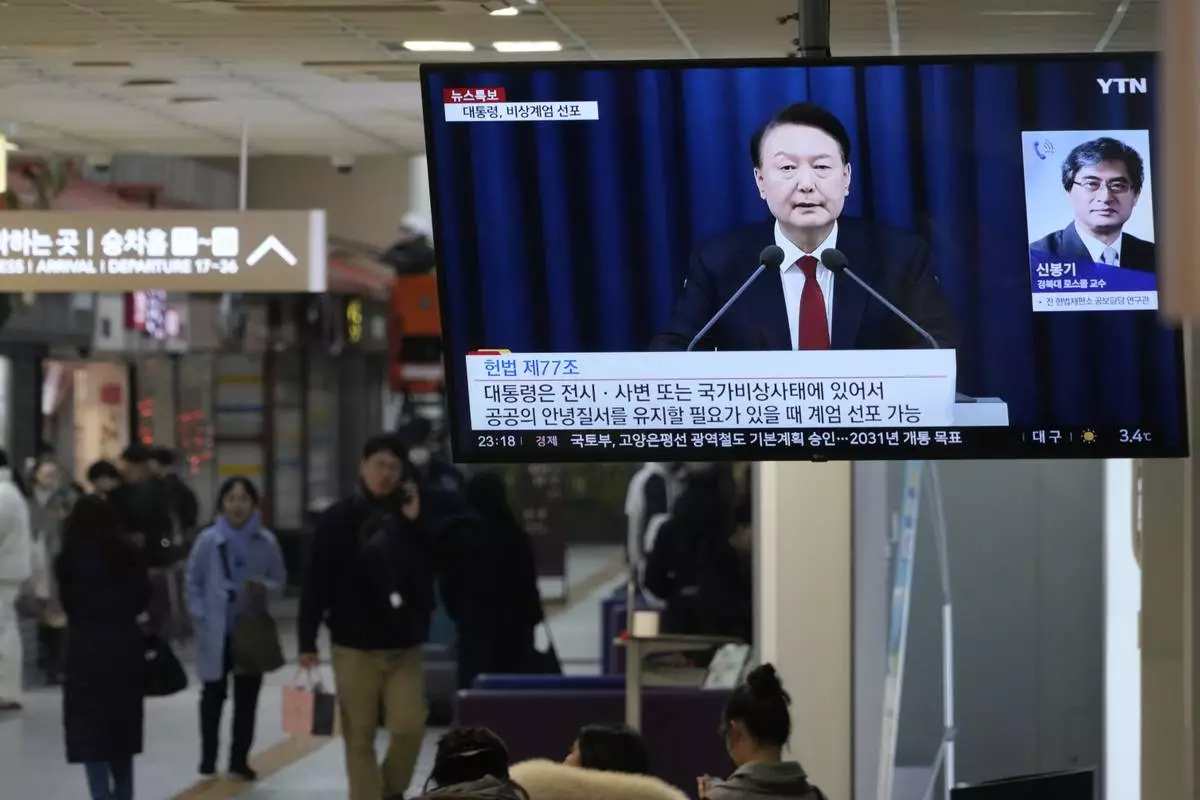
A TV screen shows South Korean President Yoon Suk Yeol's televised briefing at a bus terminal in Seoul, South Korea, Tuesday, Dec. 3, 2024. (AP Photo/Ahn Young-joon)
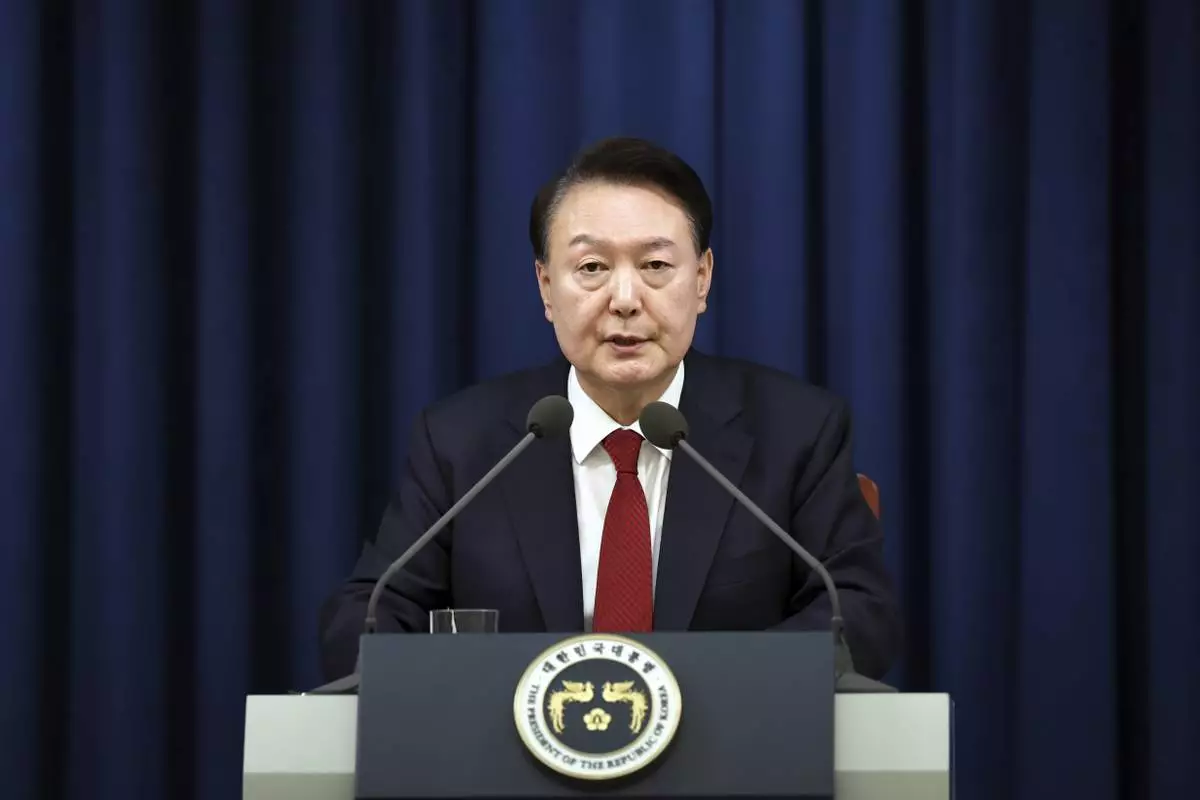
In this photo provided by South Korea Presidential Office, South Korean President Yoon Suk Yeol speaks during a press briefing at the presidential office in Seoul, South Korea, Tuesday, Dec. 3, 2024. (South Korea Unification Ministry via AP).
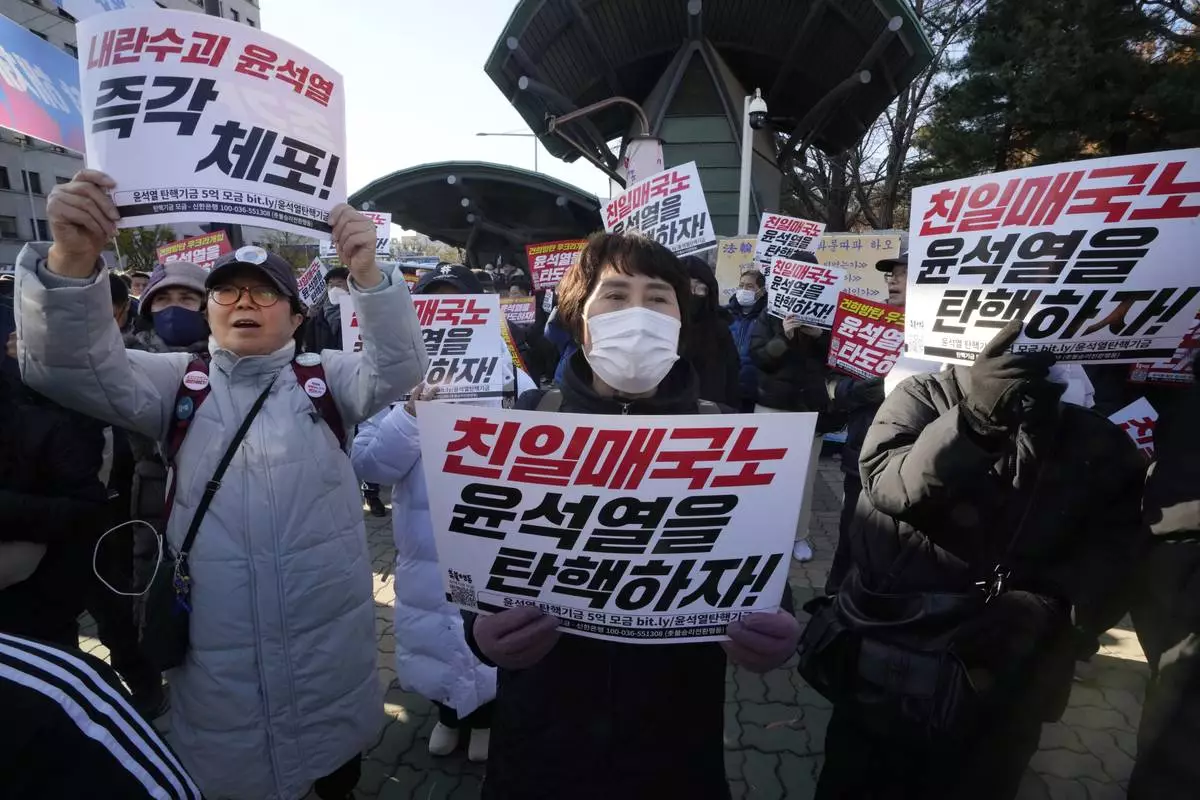
Members of main opposition Democratic Party stage a rally against South Korean President Yoon Suk Yeol in front of the National Assembly in Seoul, South Korea, Wednesday, Dec. 4, 2024. The signs read "Let's impeach Yoon Suk Yeol ." (AP Photo/Ahn Young-joon)
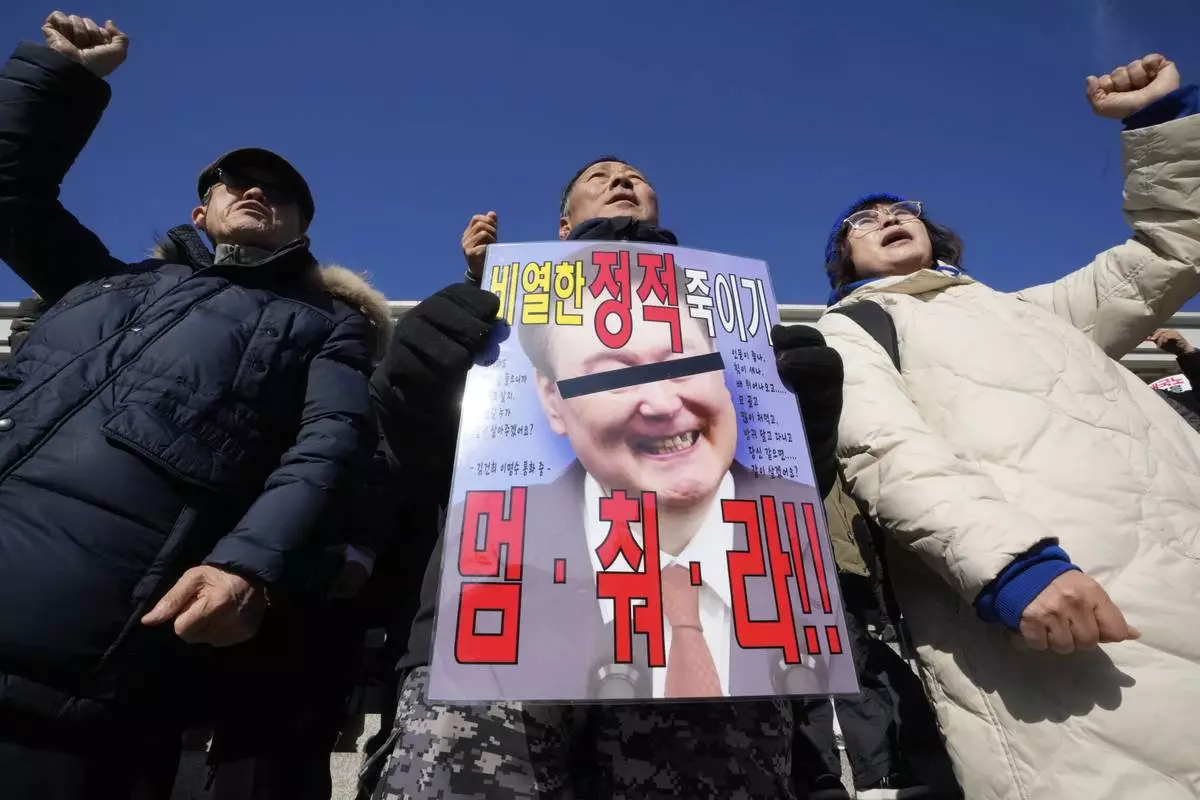
Members of main opposition Democratic Party shout slogans during a rally against South Korean President Yoon Suk Yeol at the National Assembly in Seoul, South Korea, Wednesday, Dec. 4, 2024. The signs read "Stop." (AP Photo/Ahn Young-joon)
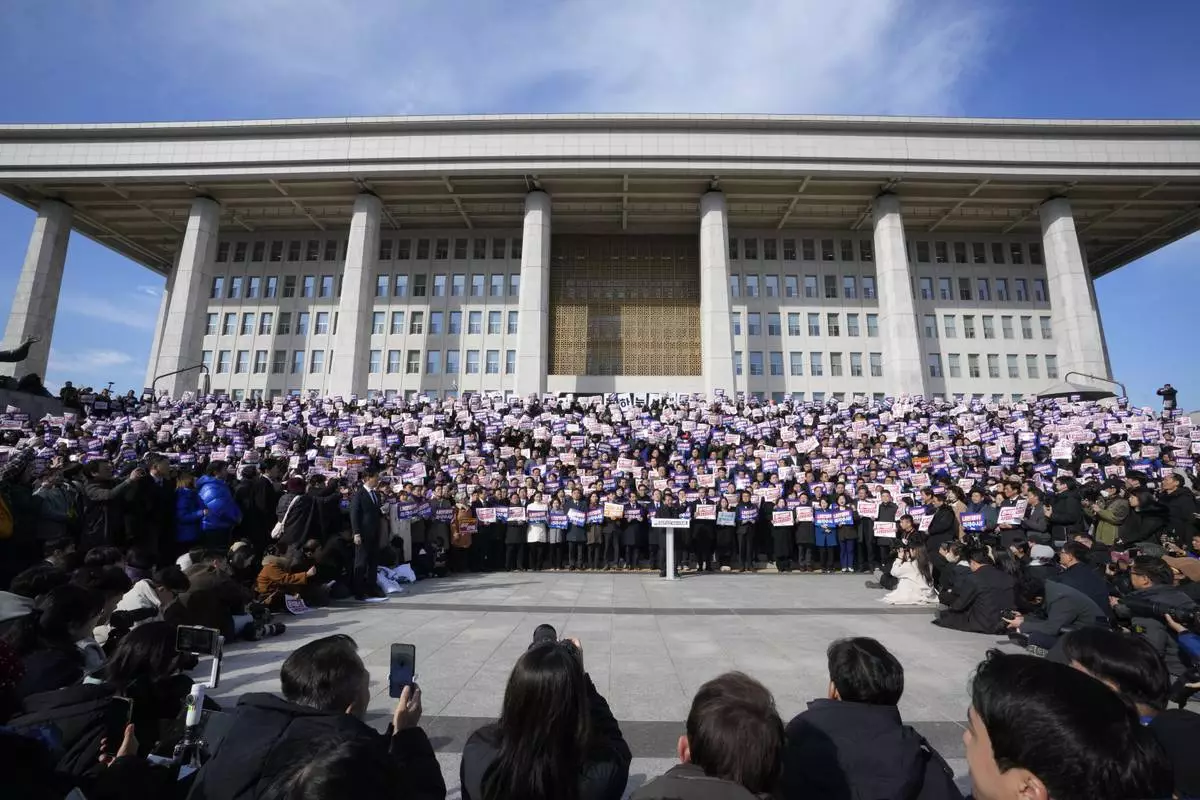
Members of main opposition Democratic Party stage a rally against South Korean President Yoon Suk Yeol at the National Assembly in Seoul, South Korea, Wednesday, Dec. 4, 2024. (AP Photo/Ahn Young-joon)
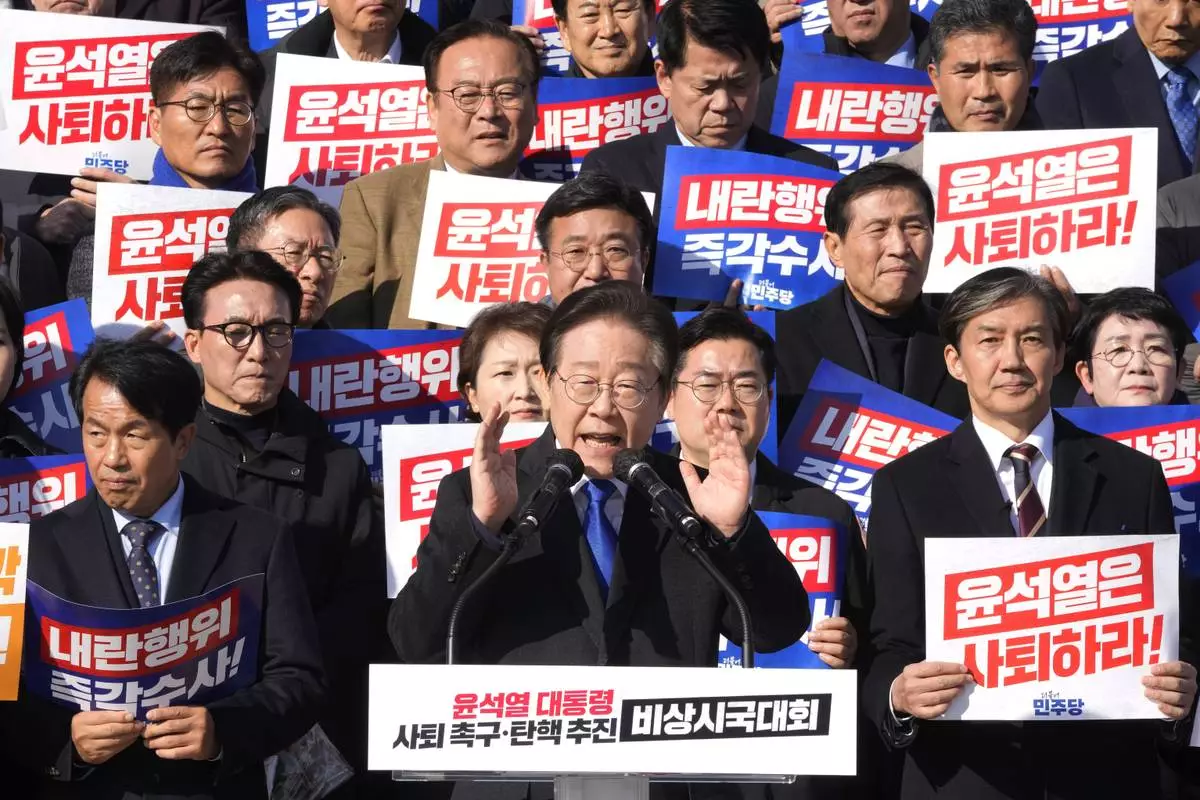
South Korea's main opposition Democratic Party leader Lee Jae-myung, bottom center, speaks during a rally against President Yoon Suk Yeol at the National Assembly in Seoul, South Korea, Wednesday, Dec. 4, 2024. The signs read "Yoon Suk Yeol should resign." (AP Photo/Ahn Young-joon)
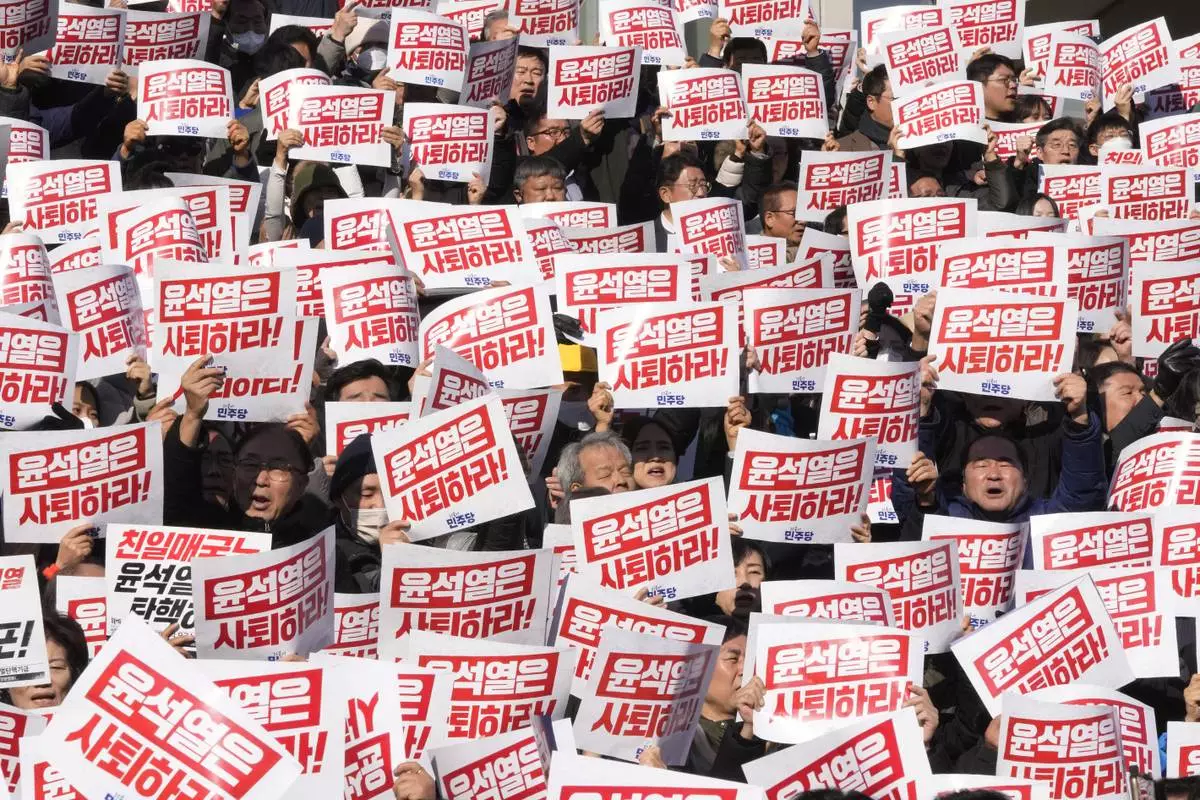
Members of main opposition Democratic Party stage a rally against South Korean President Yoon Suk Yeol at the National Assembly in Seoul, South Korea, Wednesday, Dec. 4, 2024. The signs read "Yoon Suk Yeol should resign." (AP Photo/Ahn Young-joon)
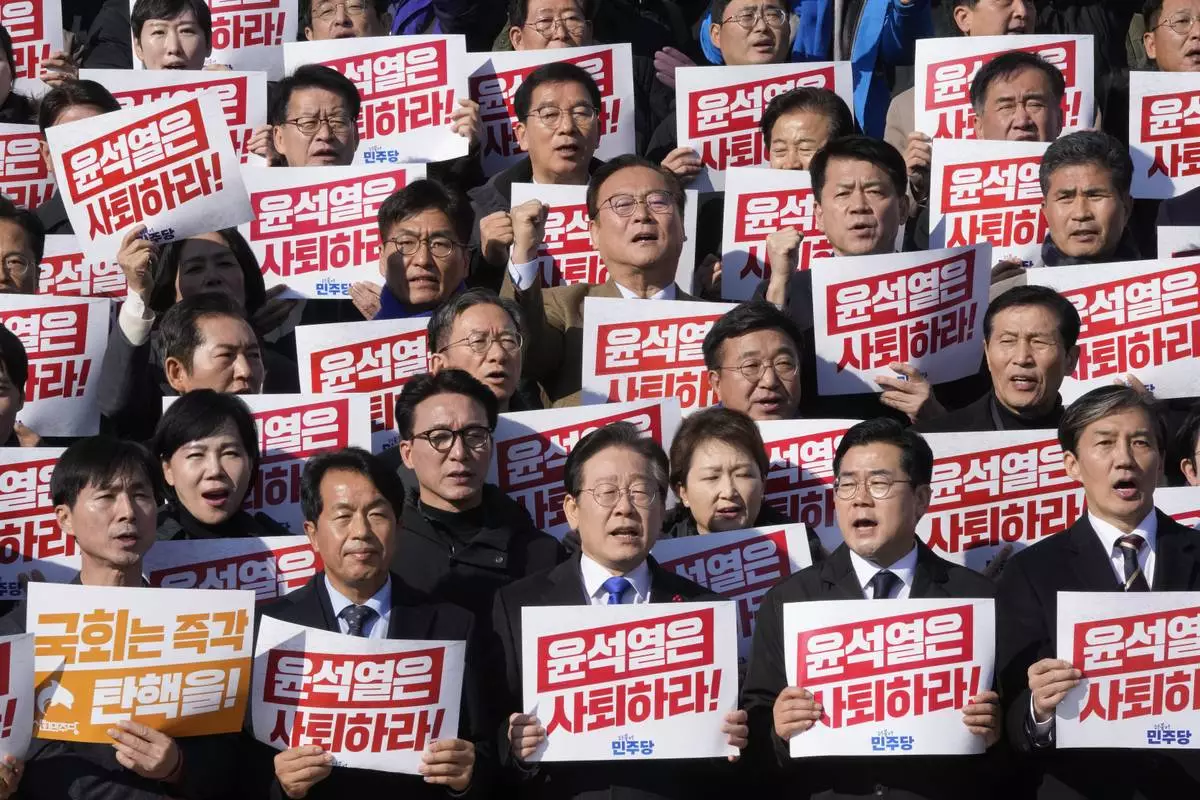
South Korea's main opposition Democratic Party leader Lee Jae-myung, bottom center, shout slogans during a rally against President Yoon Suk Yeol at the National Assembly in Seoul, South Korea, Wednesday, Dec. 4, 2024. The signs read "Yoon Suk Yeol should resign." (AP Photo/Ahn Young-joon)
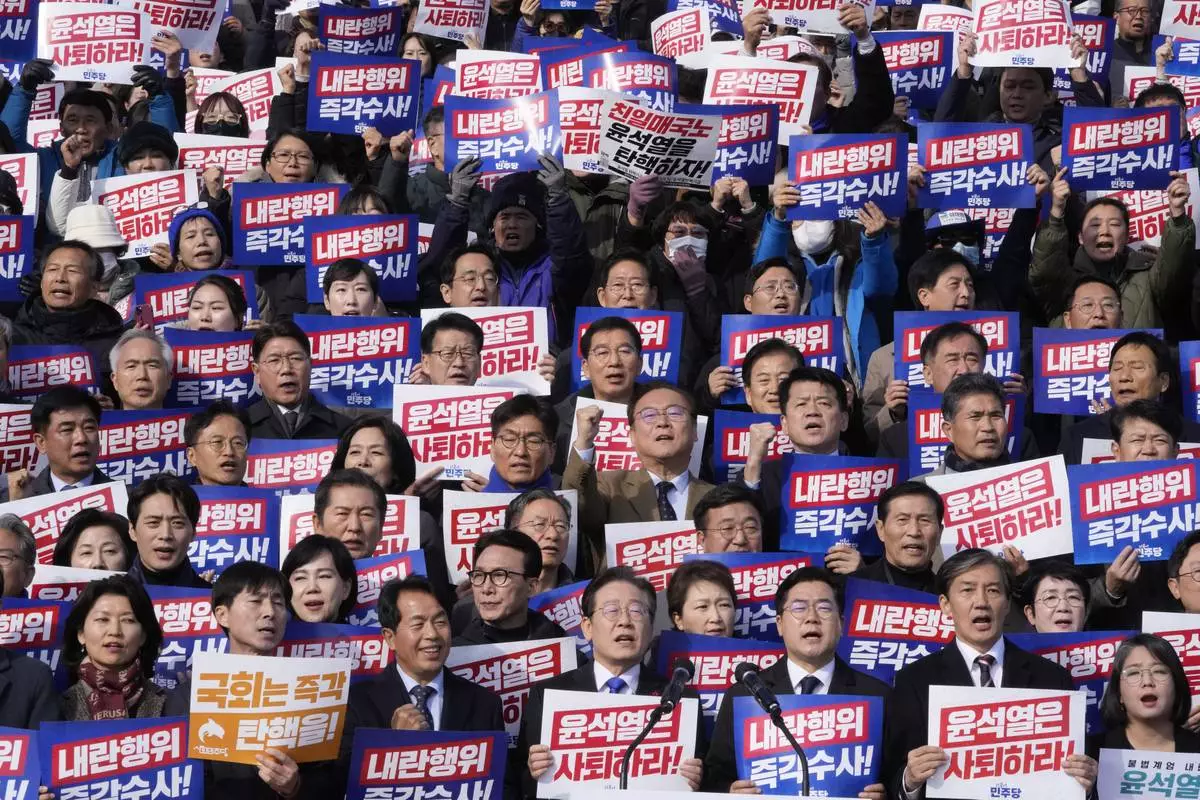
South Korea's main opposition Democratic Party leader Lee Jae-myung, bottom center, shout slogans during a rally against President Yoon Suk Yeol at the National Assembly in Seoul, South Korea, Wednesday, Dec. 4, 2024. The signs read "Yoon Suk Yeol should resign." (AP Photo/Ahn Young-joon)
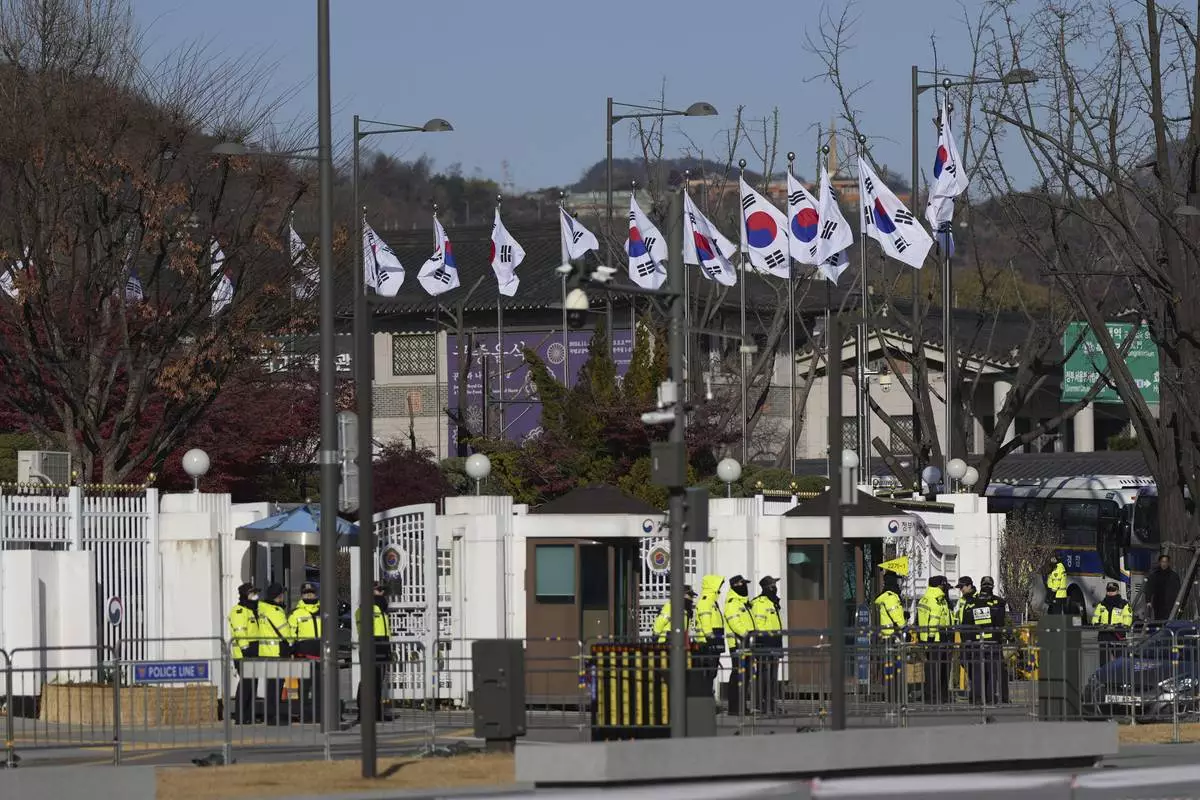
South Korean police officers stand guard in front of the government complex in Seoul, South Korea, Wednesday, Dec. 4, 2024. (AP Photo/Lee Jin-man)
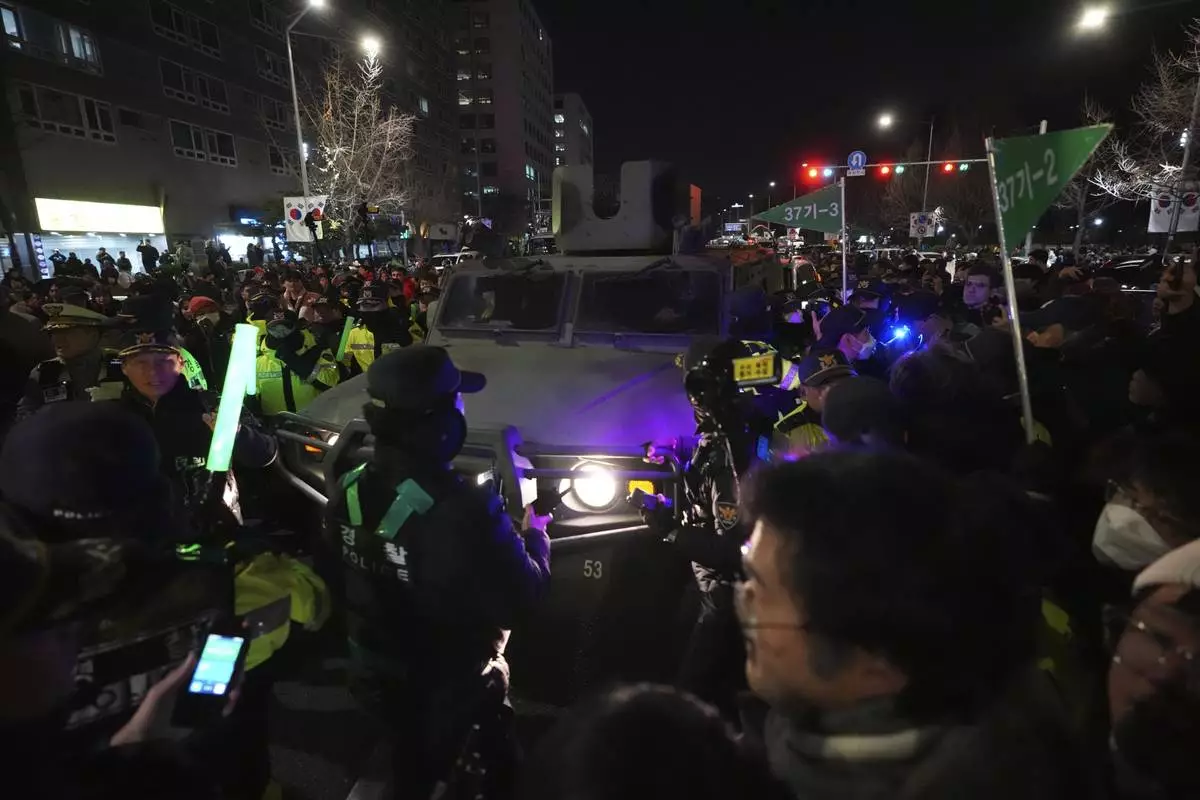
Military vehicle is escorted by police officers as people try to block outside of the National Assembly in Seoul, South Korea, Wednesday, Dec. 4, 2024. (AP Photo/Lee Jin-man)
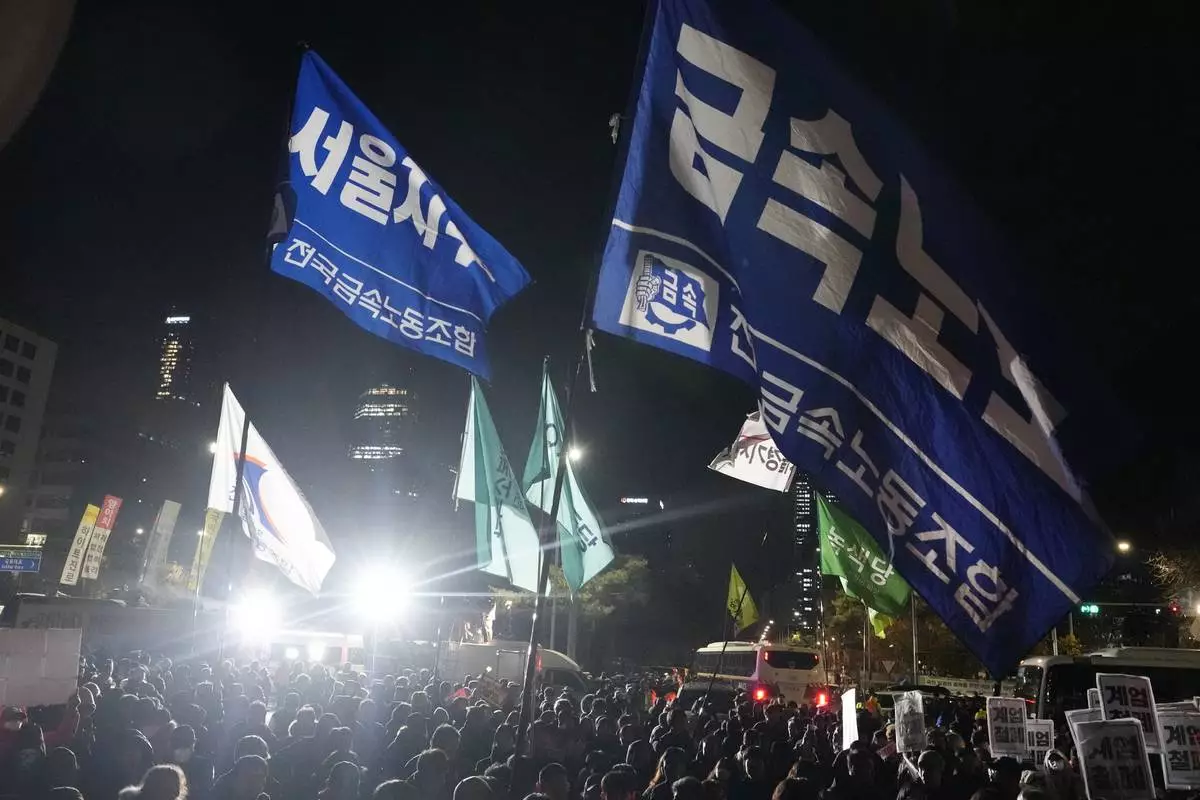
People gather to demand South Korean President Yoon Suk Yeol to step down in front of the National Assembly in Seoul, South Korea, Wednesday, Dec. 4, 2024. (AP Photo/Ahn Young-joon)
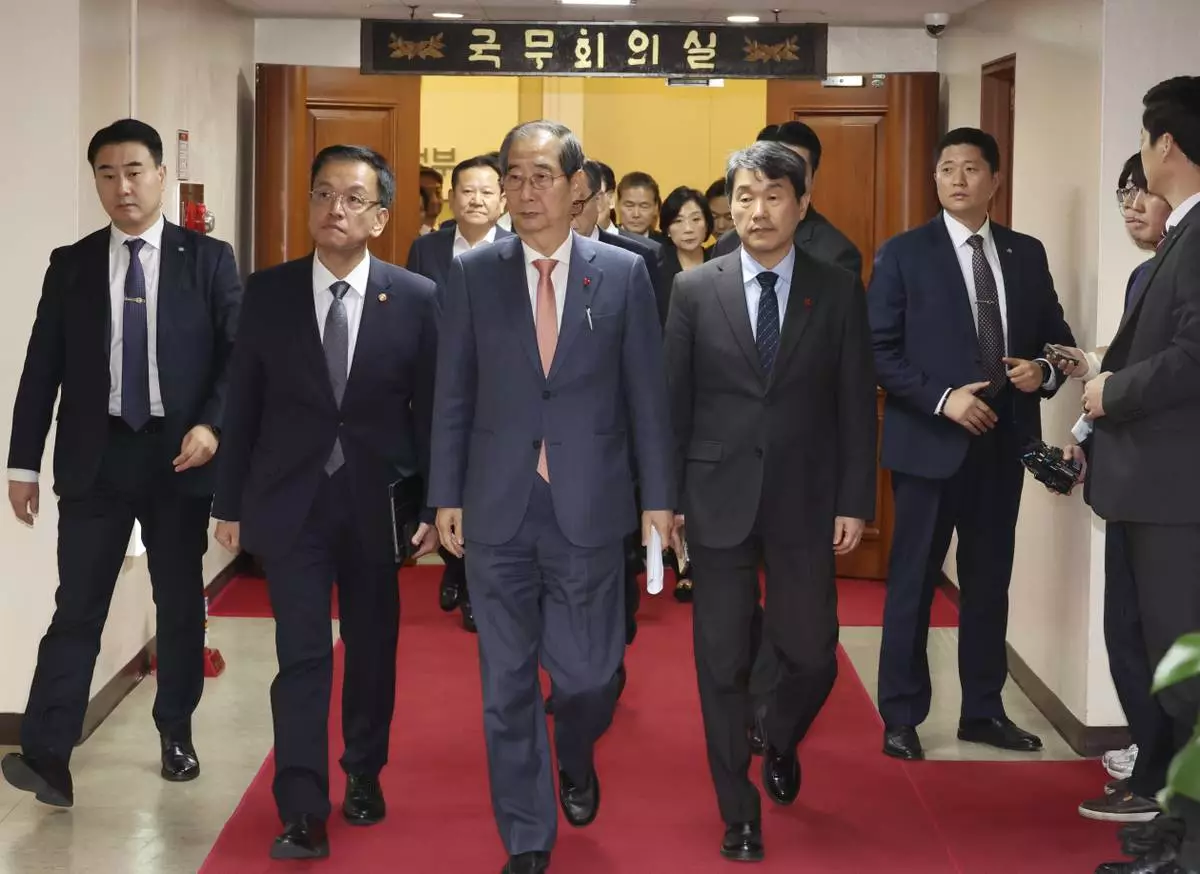
South Korean Prime Minister Han Duck-soo, center, and other ministers leave after a meeting at the government complex in Seoul, South Korea, Wednesday, Dec. 4, 2024. (Choi Jae-gu/Yonhap via AP)
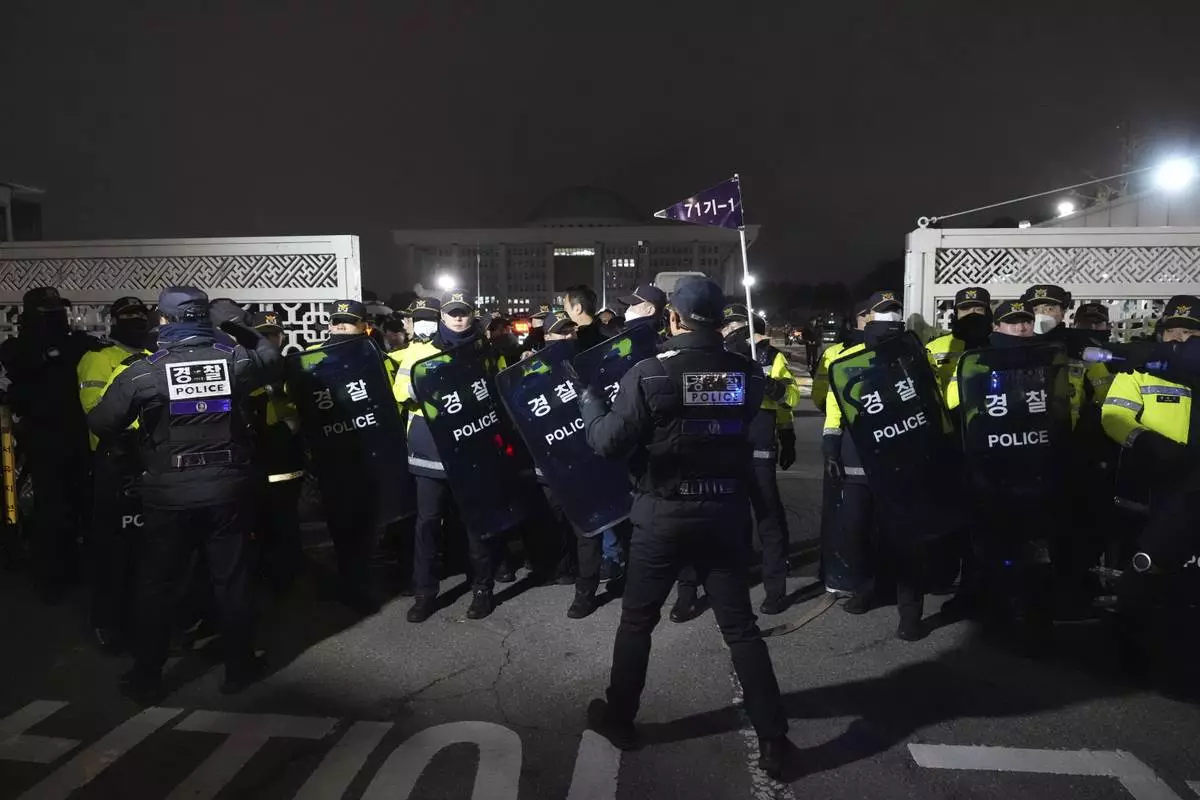
Police officers stand guard in front of the National Assembly in Seoul, South Korea, Tuesday, Dec. 3, 2024. (AP Photo/Lee Jin-man)
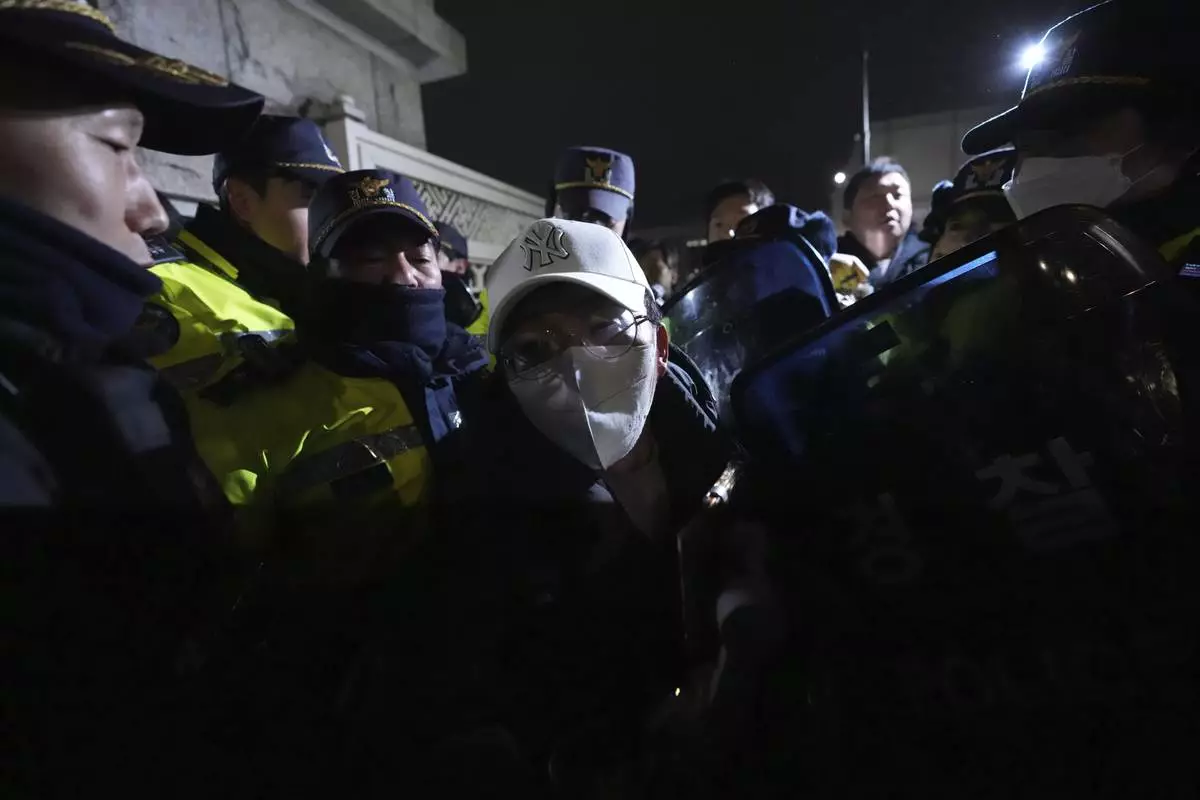
People try to enter as police officers stand guard in front of the National Assembly in Seoul, South Korea, Tuesday, Dec. 3, 2024. (AP Photo/Lee Jin-man)
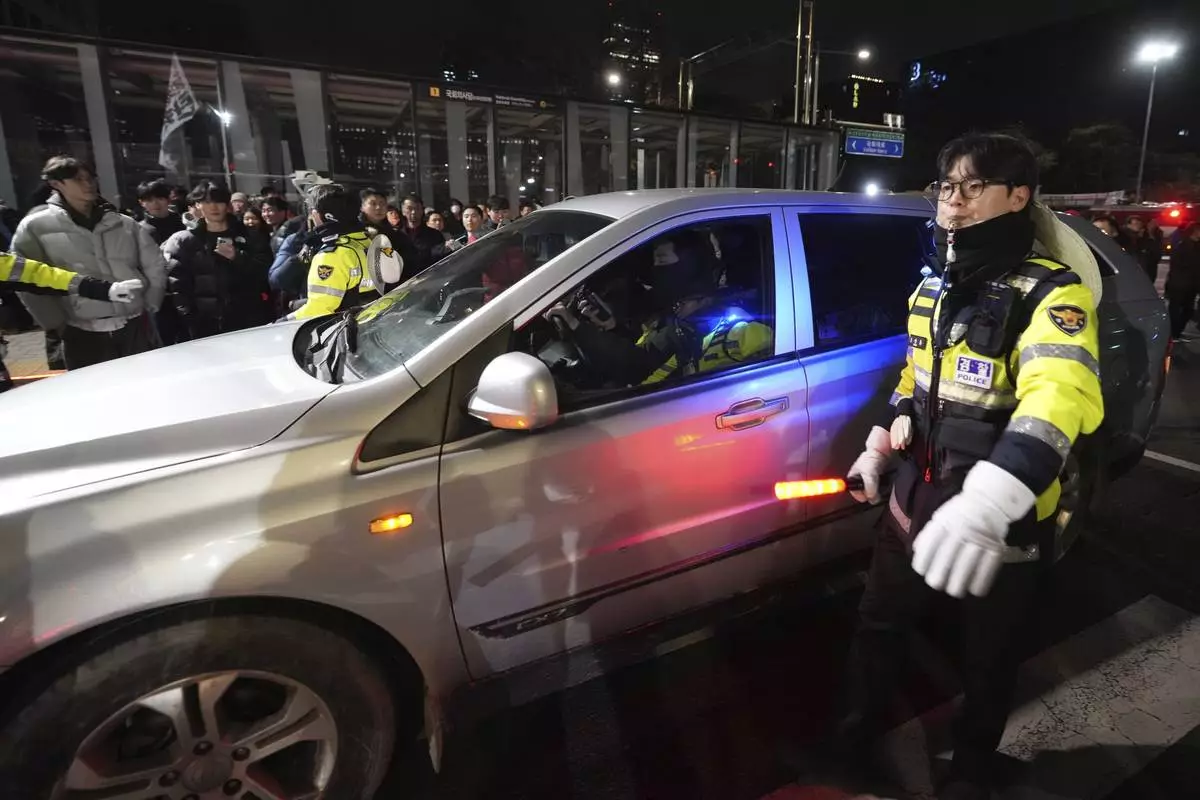
Military vehicles is escorted by police officers outside of the National Assembly in Seoul, South Korea, Wednesday, Dec. 4, 2024. (AP Photo/Lee Jin-man)
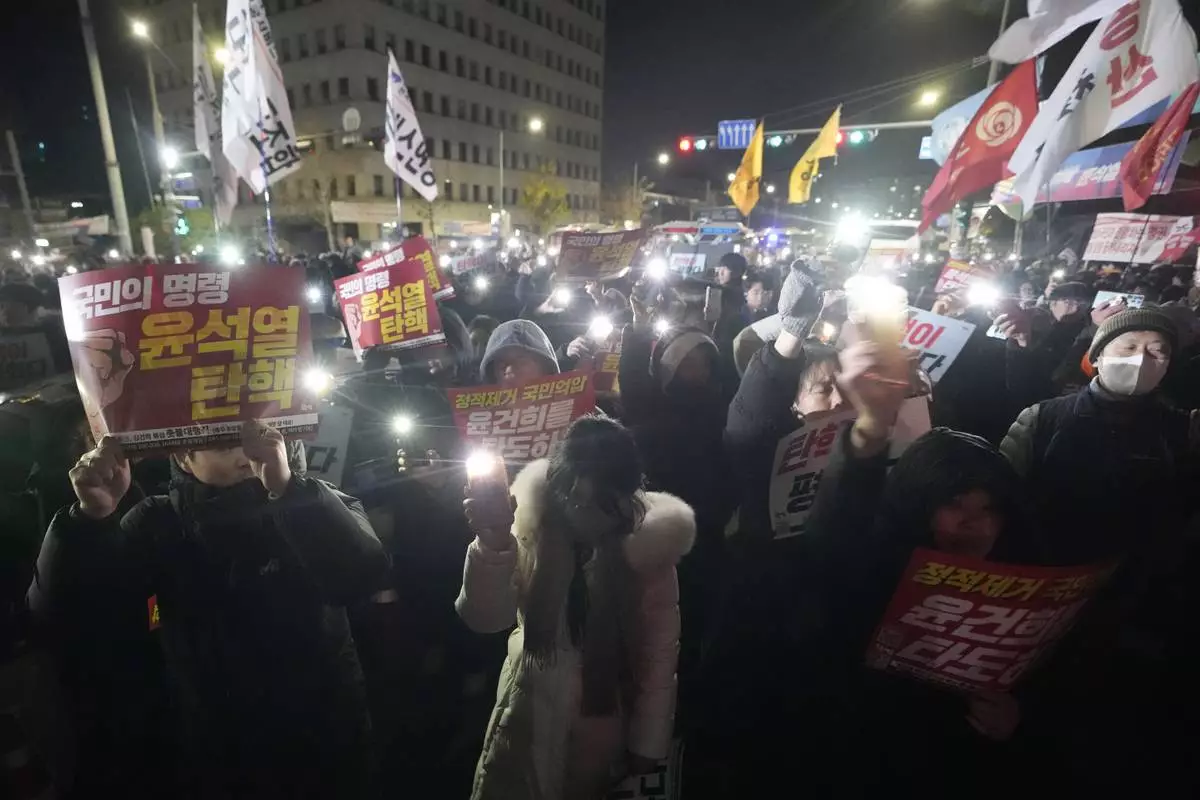
People gather to demand South Korean President Yoon Suk Yeol to step down in front of the National Assembly in Seoul, South Korea, Wednesday, Dec. 4, 2024. (AP Photo/Ahn Young-joon)
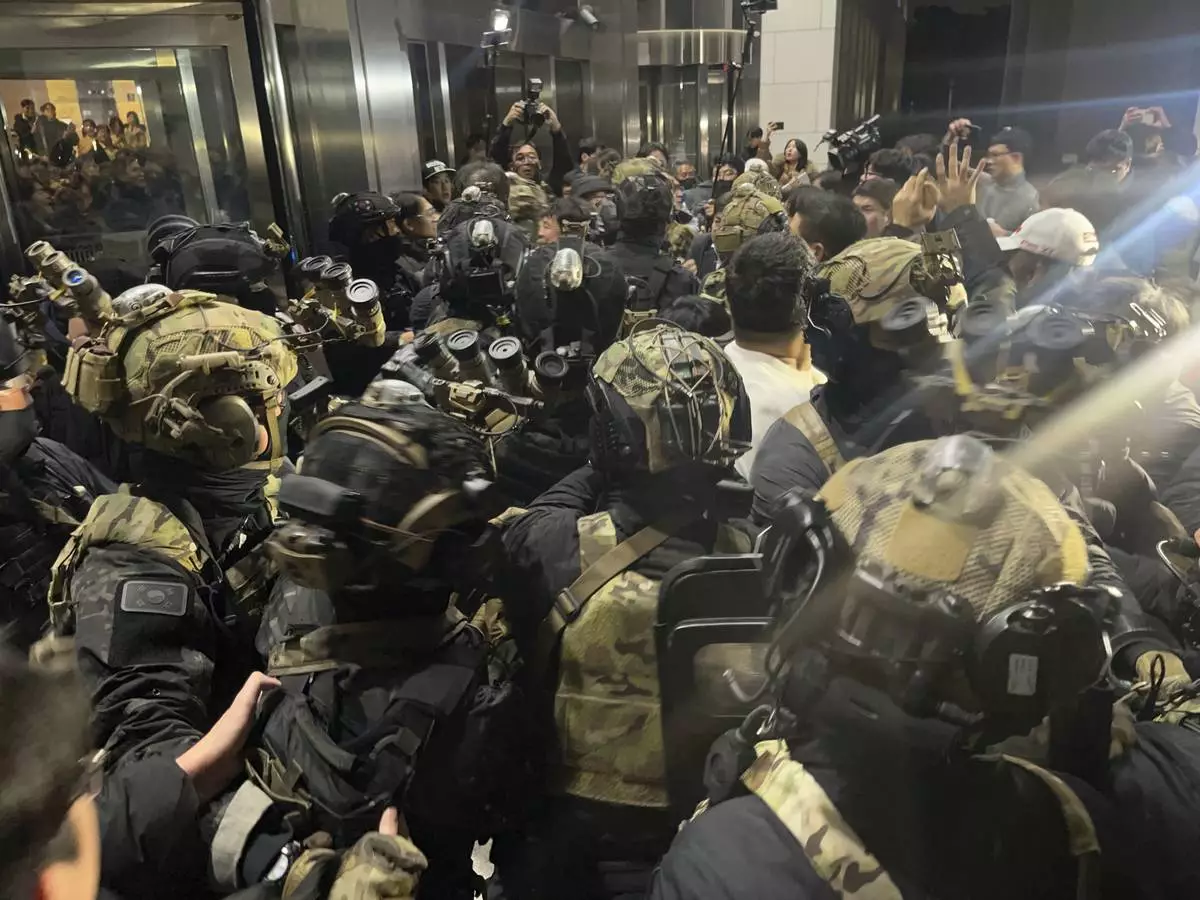
South Korean martial law soldiers try to enter the National Assembly compound in Seoul, South Korea, Wednesday, Dec. 4, 2024. (Cho Jung-woo/Newsis via AP)
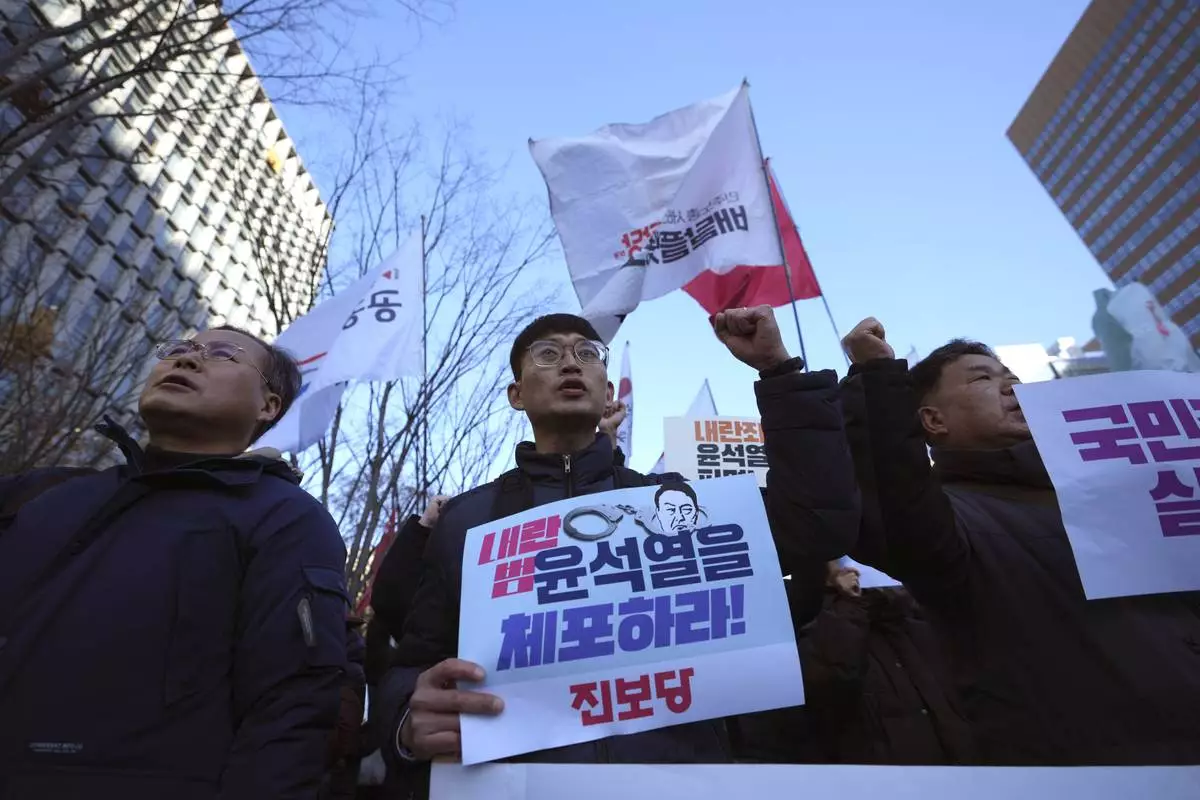
South Koreans shout slogans with signs reading "Arrest Yoon Suk Yeol" during a rally in Seoul, South Korea, Wednesday, Dec. 4, 2024. (AP Photo/Lee Jin-man)
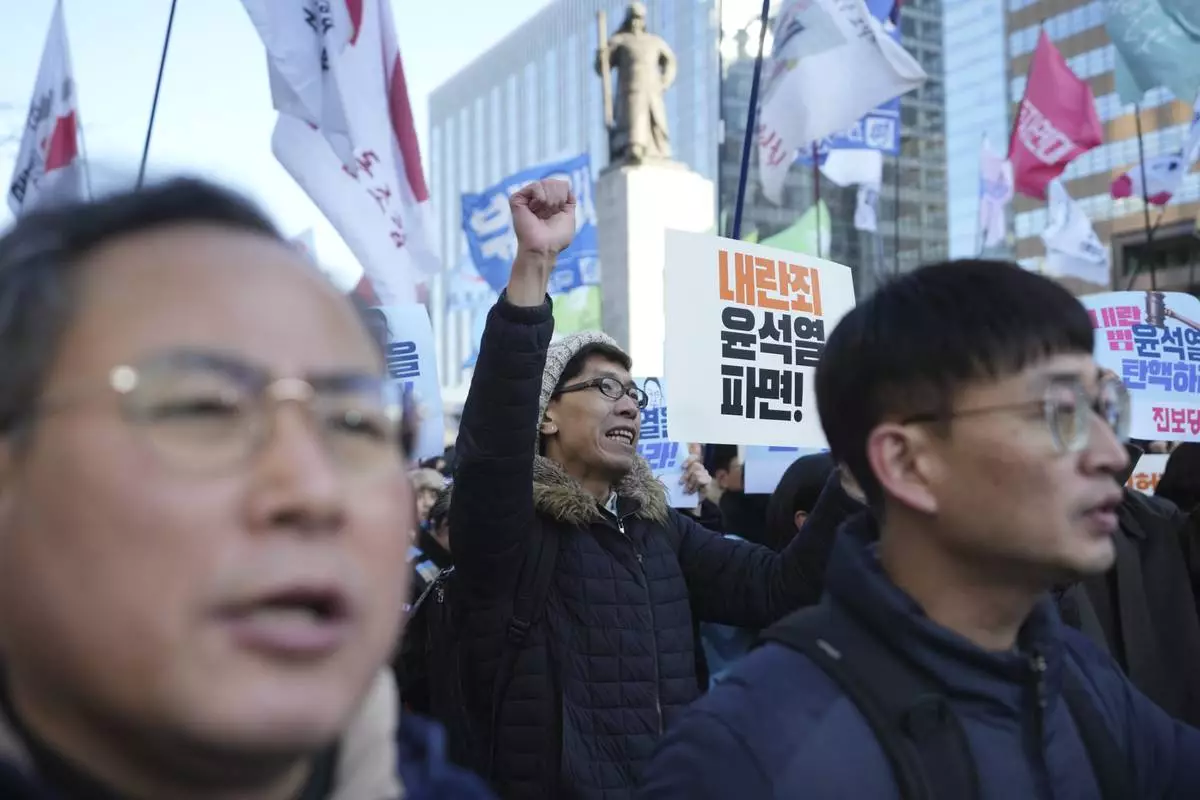
South Koreans shout slogans during a rally in Seoul, South Korea, Wednesday, Dec. 4, 2024. (AP Photo/Lee Jin-man)
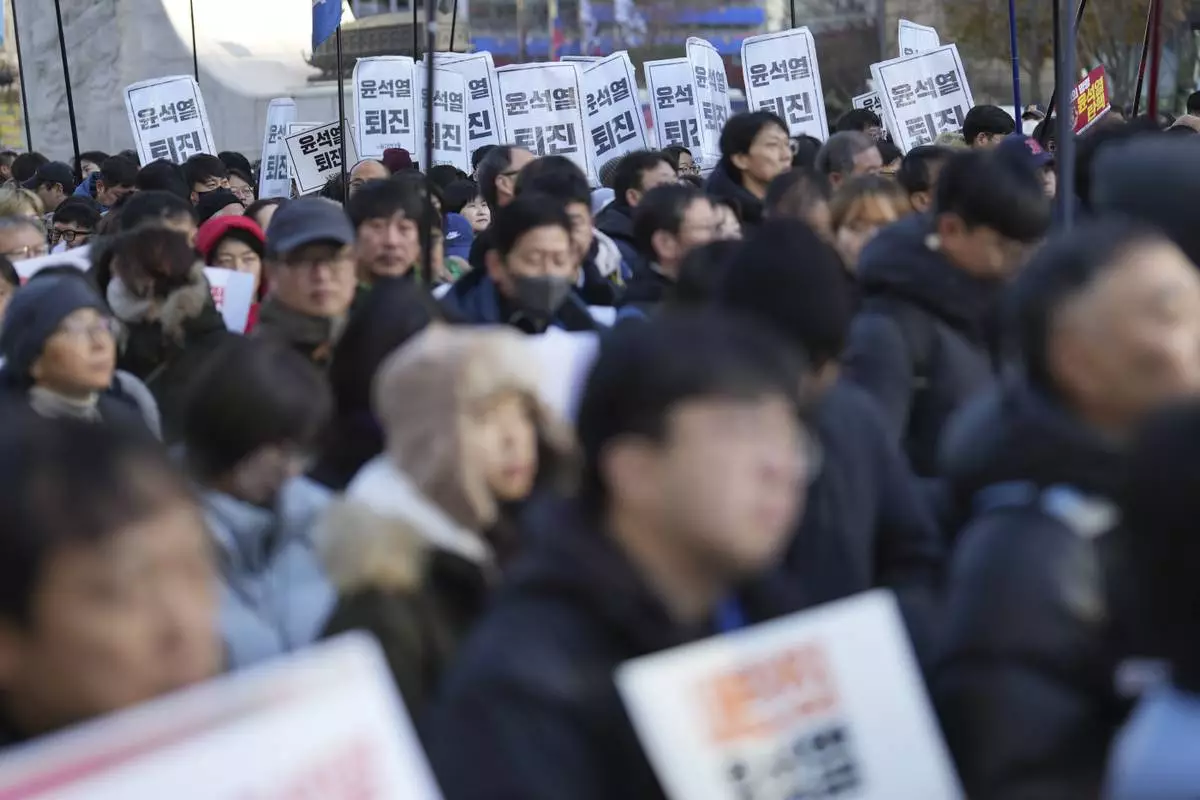
South Koreans hold signs reading "Resign Yoon Suk Yeol" during a rally in Seoul, South Korea, Wednesday, Dec. 4, 2024. (AP Photo/Lee Jin-man)
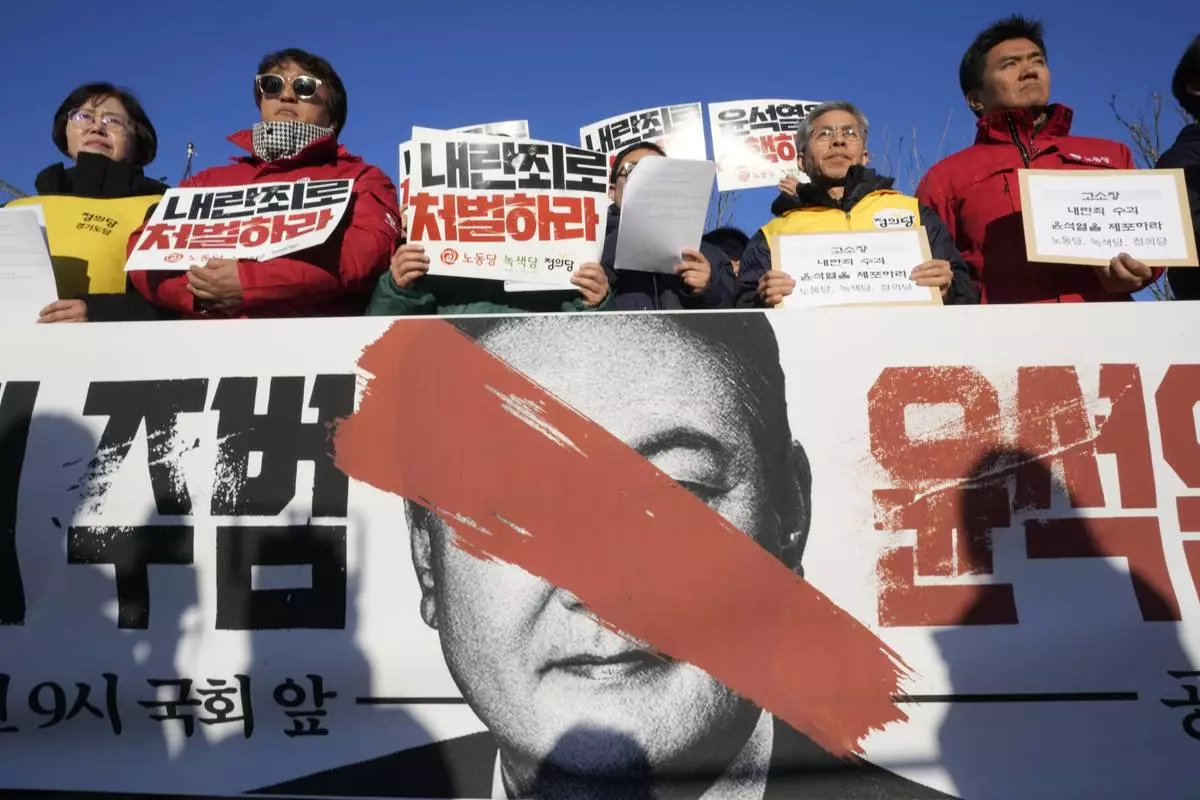
Protesters stage a rally to demand South Korean President Yoon Suk Yeol to step down in front of the National Assembly in Seoul, South Korea, Wednesday, Dec. 4, 2024. The signs read "Punish." (AP Photo/Ahn Young-joon)
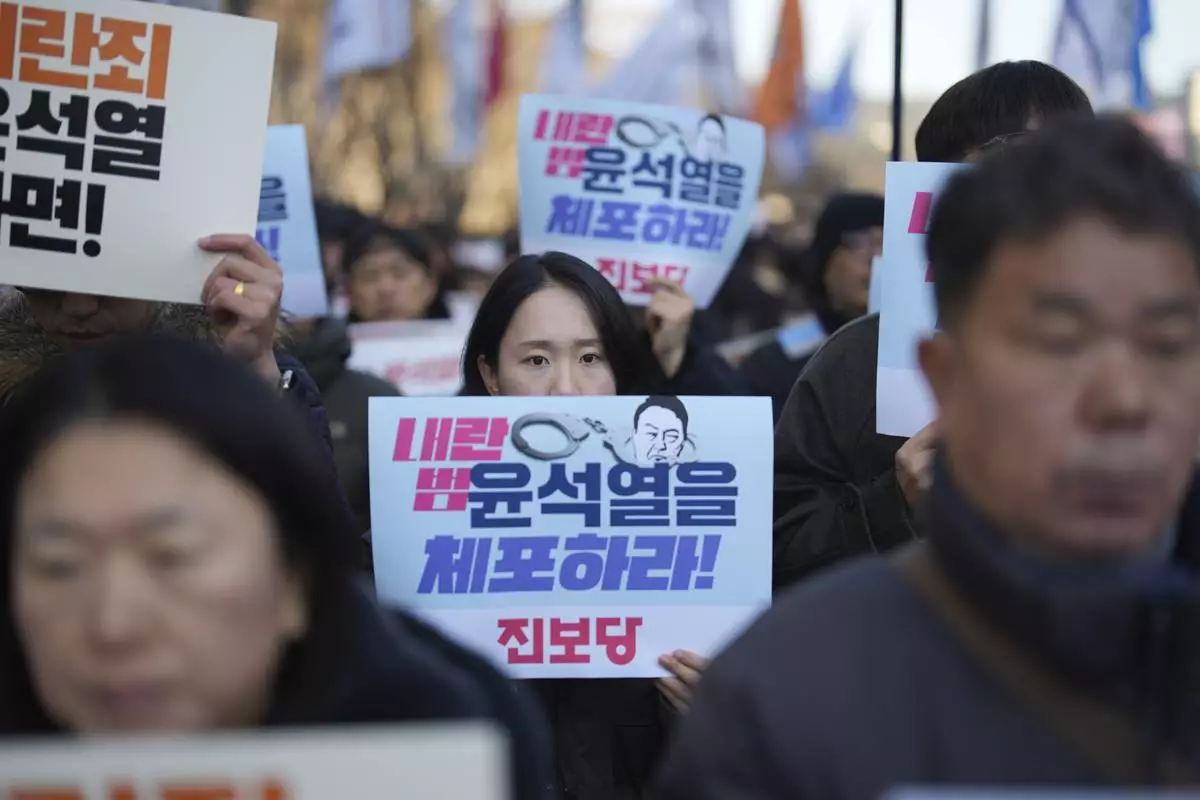
South Koreans hold signs reading "Arrest Yoon Suk Yeol" during a rally in Seoul, South Korea, Wednesday, Dec. 4, 2024. (AP Photo/Lee Jin-man)
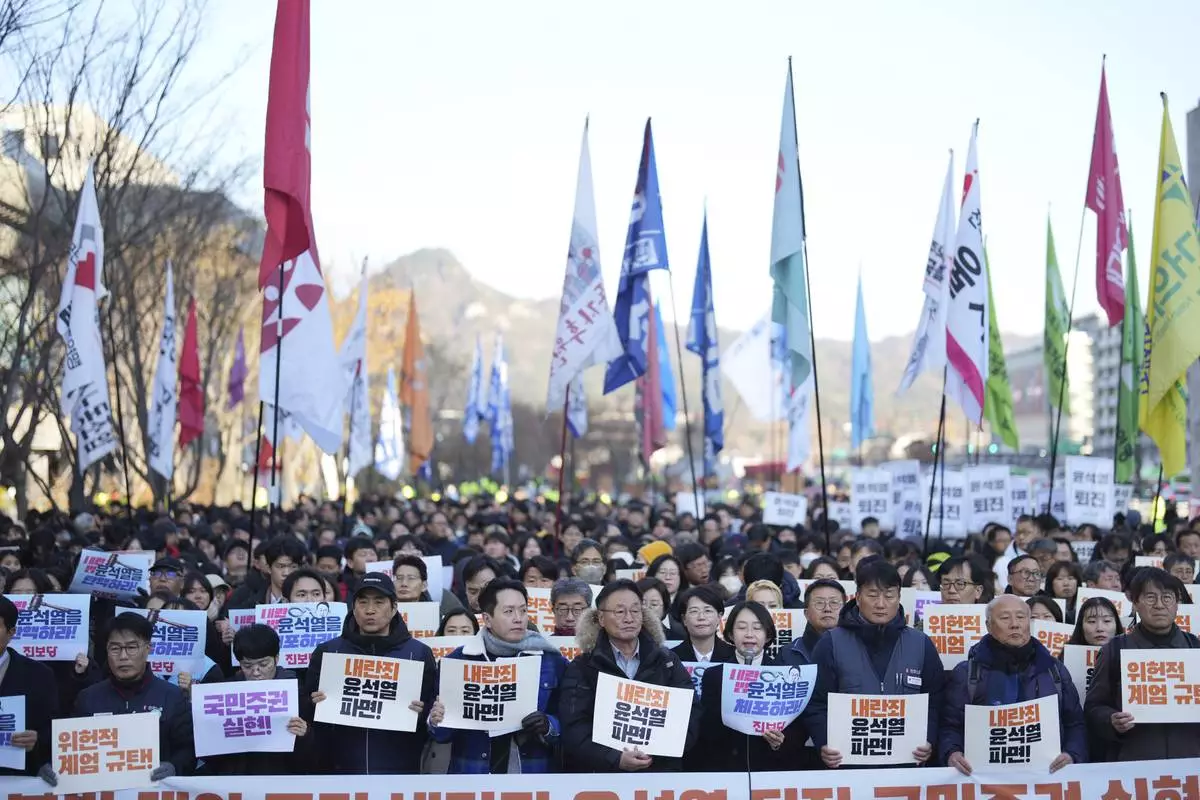
South Koreans hold signs reading "Expulsion of Yoon Suk Yeol" during a rally in Seoul, South Korea, Wednesday, Dec. 4, 2024. (AP Photo/Lee Jin-man)
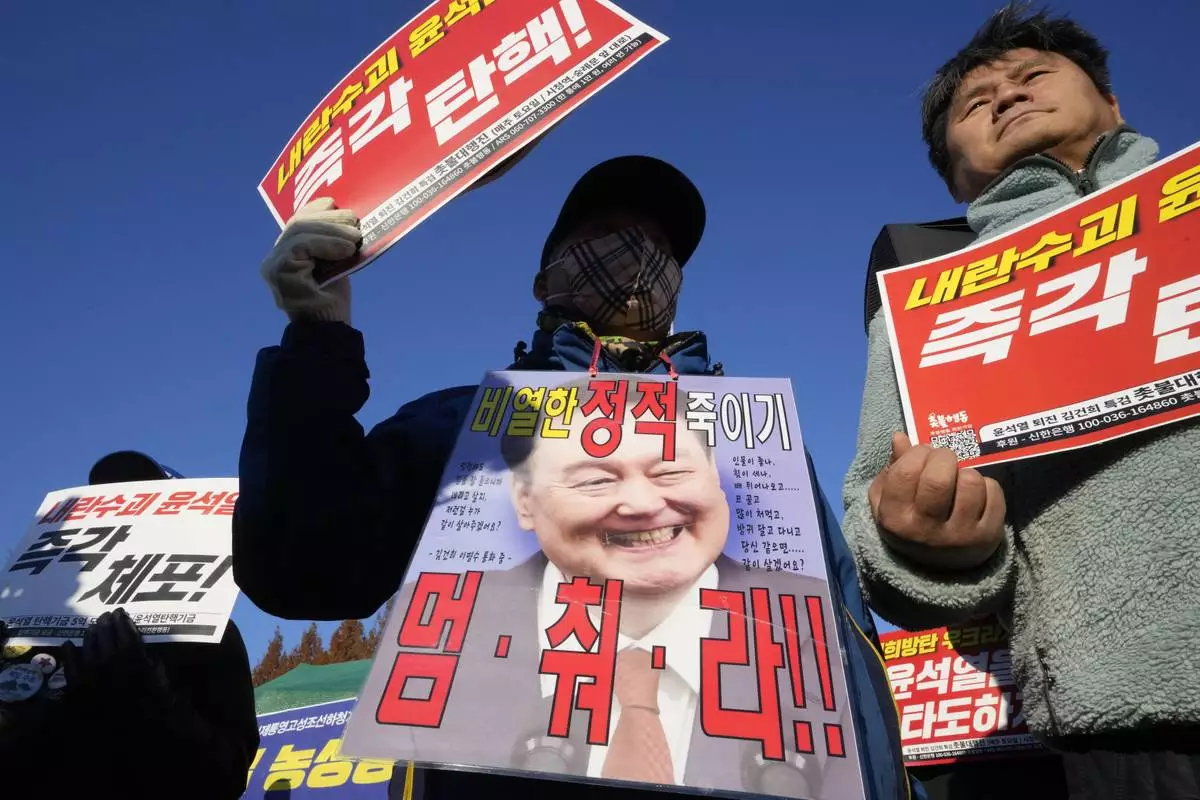
Protesters attend a rally to demand South Korean President Yoon Suk Yeol to step down in front of the National Assembly in Seoul, South Korea, Wednesday, Dec. 4, 2024. The signs read "Stop." (AP Photo/Ahn Young-joon)
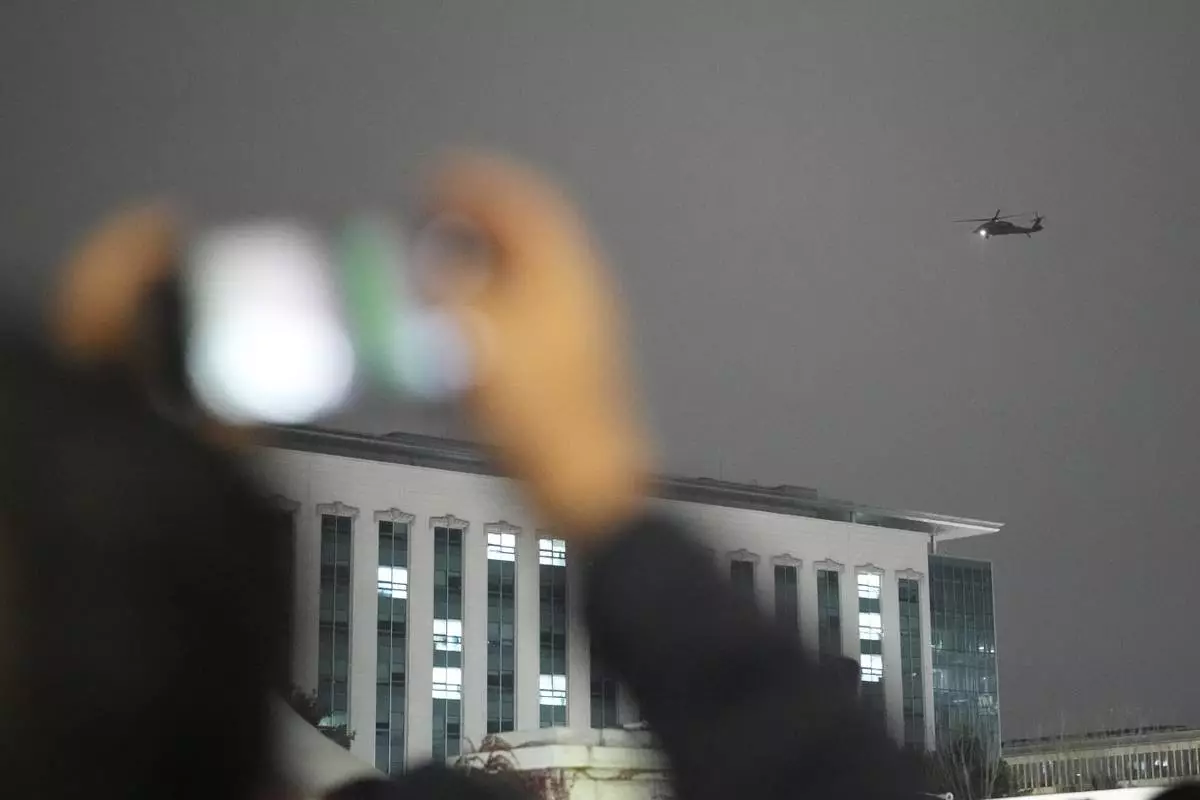
A helicopter flies over the National Assembly in Seoul, South Korea, Wednesday, Dec. 4, 2024. (AP Photo/Lee Jin-man)
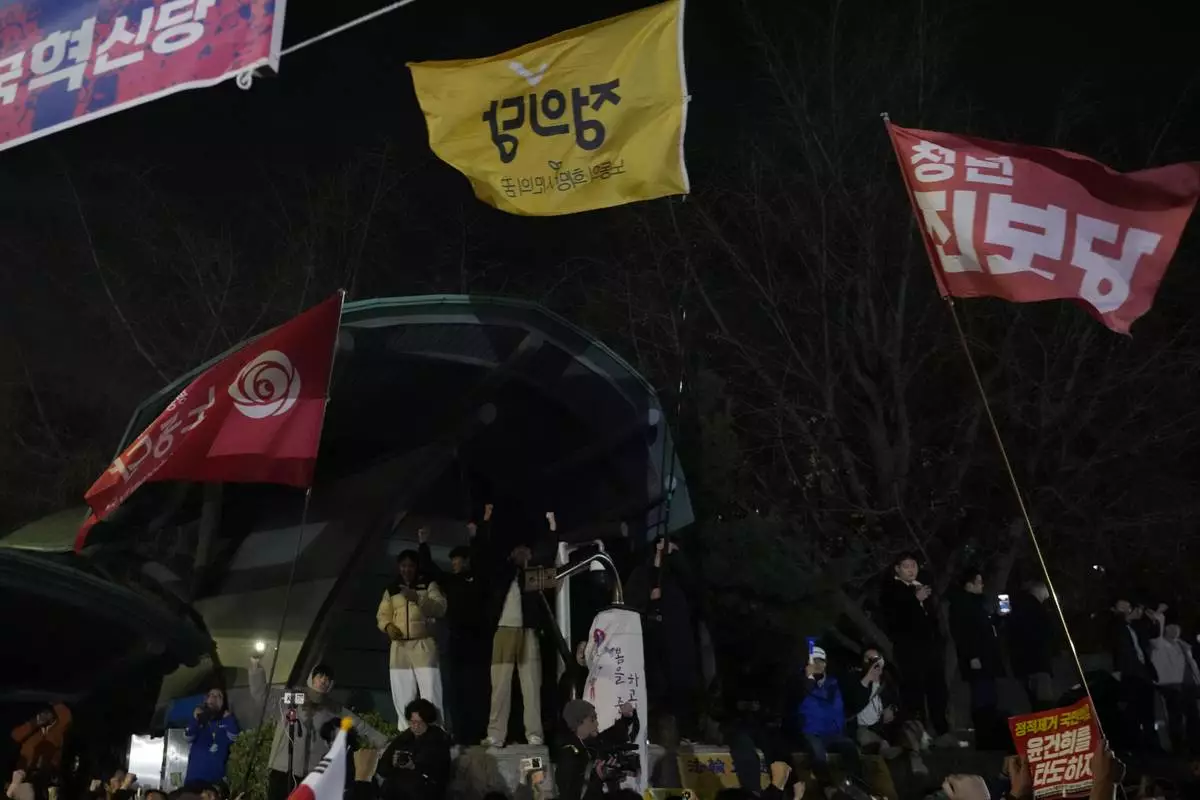
People gather in front of the National Assembly in Seoul, South Korea, Wednesday, Dec. 4, 2024. (AP Photo/Ahn Young-joon)
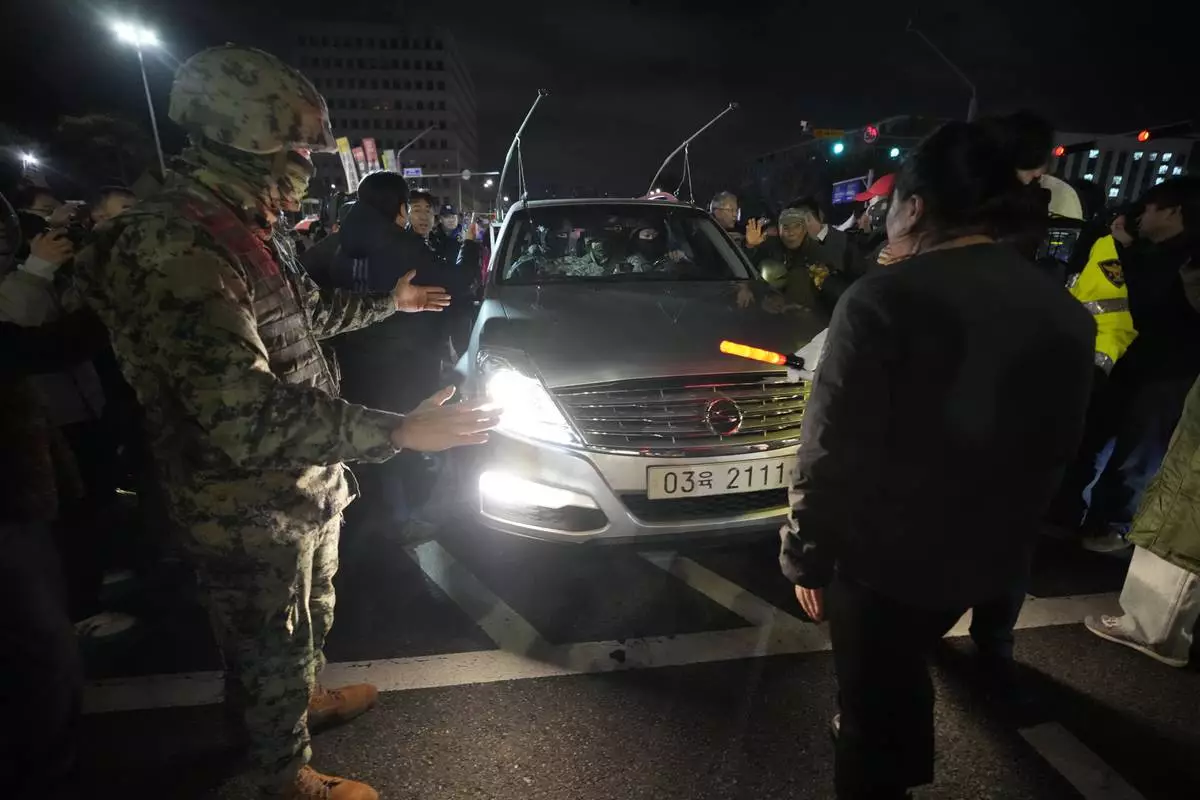
People bock a martial law vehicle as they gather to demand South Korean President Yoon Suk Yeol to step down in front of the National Assembly in Seoul, South Korea, Wednesday, Dec. 4, 2024. (AP Photo/Ahn Young-joon)
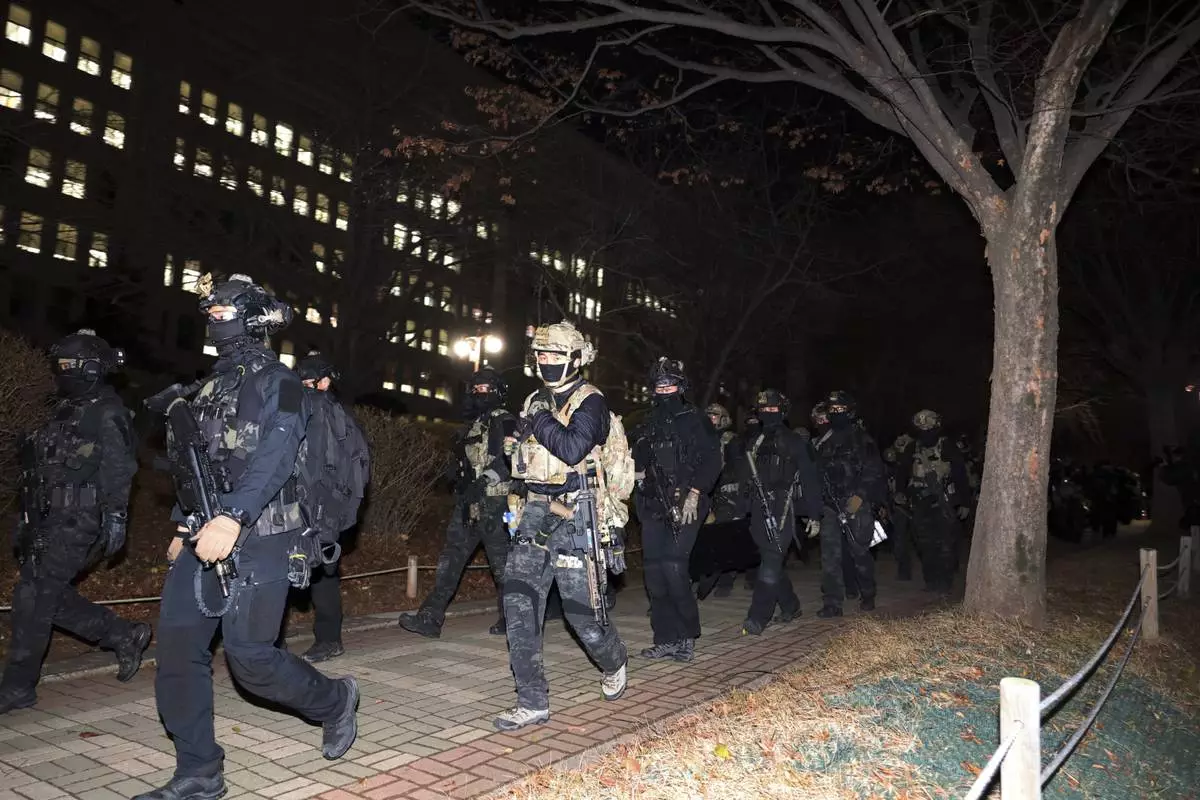
South Korean martial law soldiers leave the National Assembly in Seoul, South Korea, Wednesday, Dec. 4, 2024. (Kim Ju-sung/Yonhap via AP)
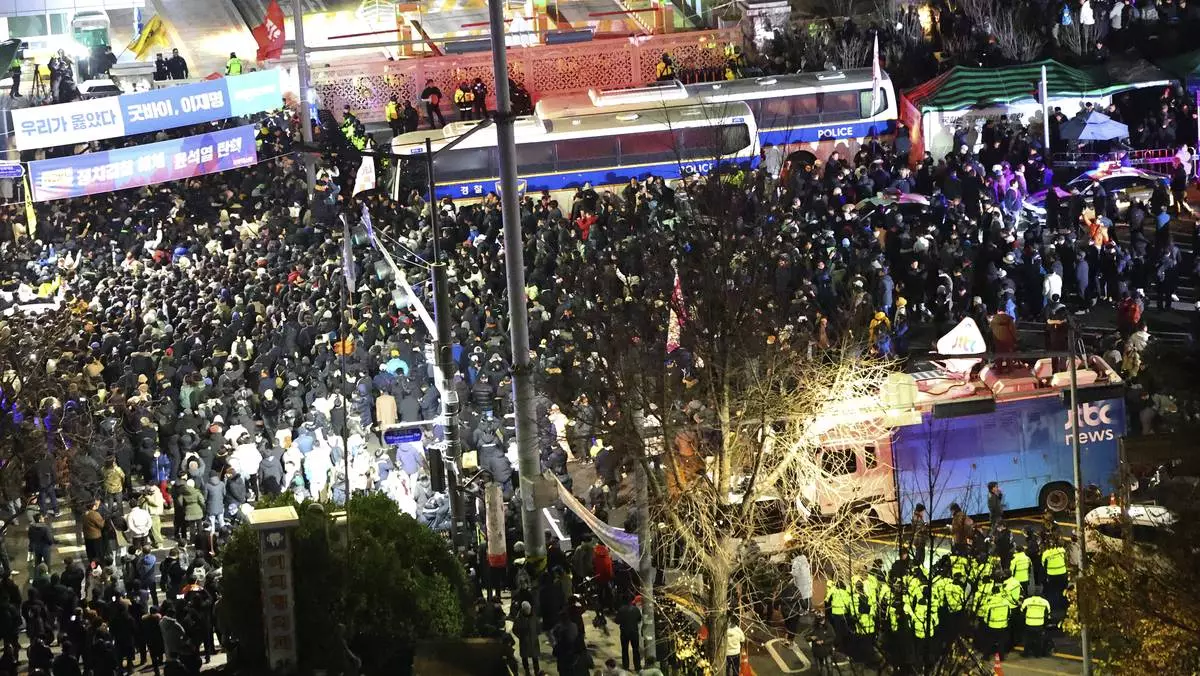
People gather to demand South Korean President Yoon Suk Yeol step down in front of the National Assembly in Seoul, South Korea, Wednesday, Dec. 4, 2024. (Kim Do-hoon/Yonhap via AP)
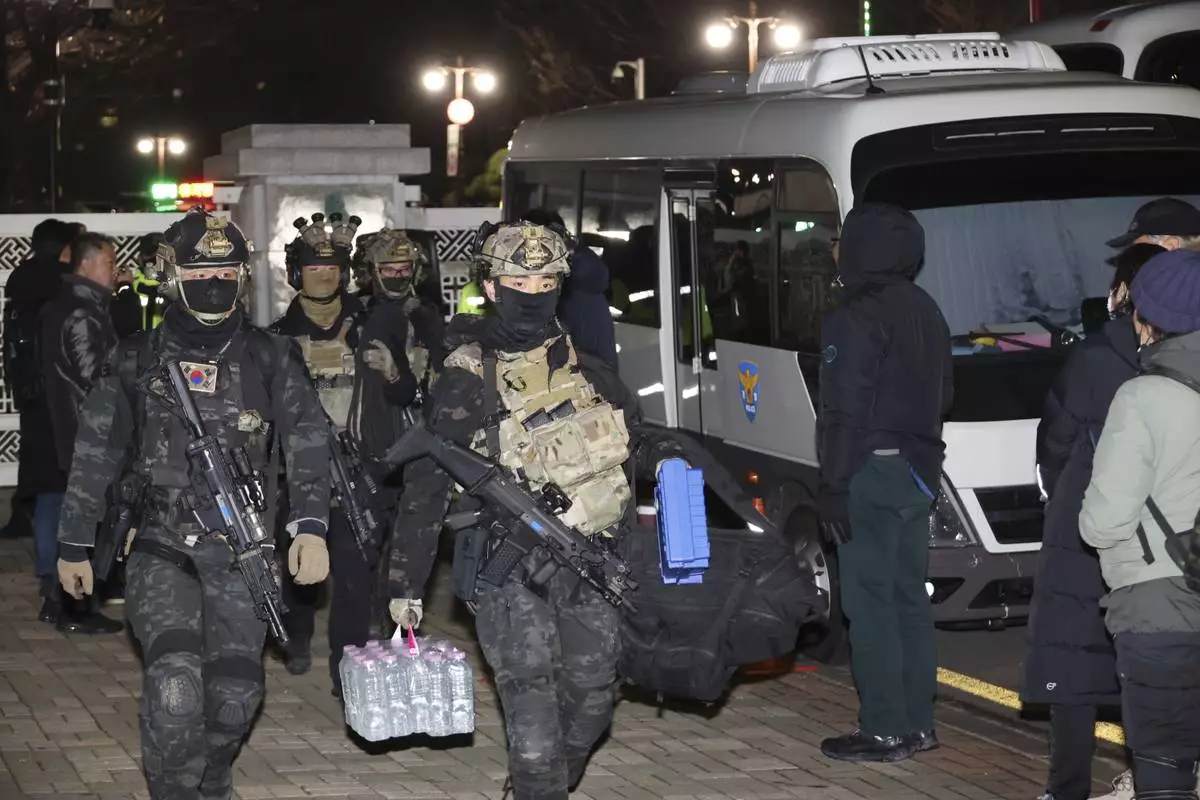
South Korean martial law soldiers leave the National Assembly in Seoul, South Korea, Wednesday, Dec. 4, 2024. (Kim Ju-sung/Yonhap via AP)
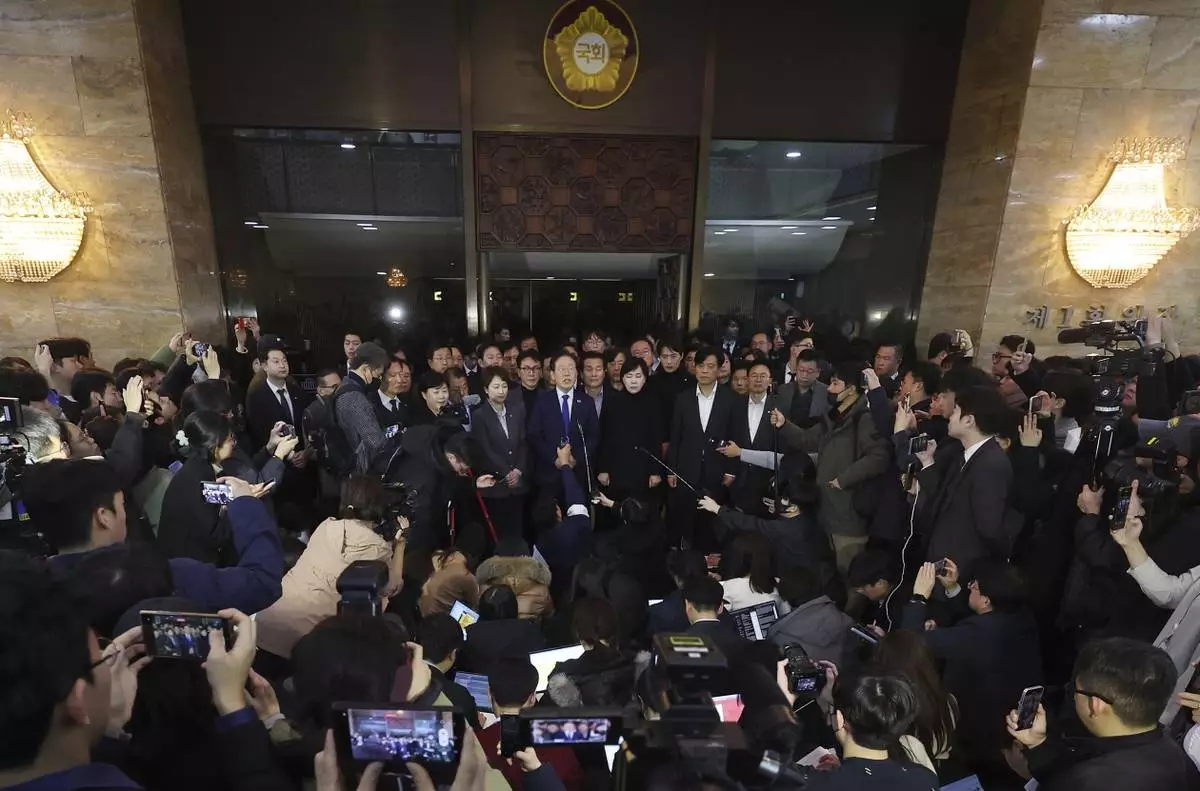
South Korea's main opposition Democratic Party leader Lee Jae-myung, top center, speaks at the National Assembly in Seoul, South Korea, Wednesday, Dec. 4, 2024. (Kim Ju-hyung/Yonhap via AP)
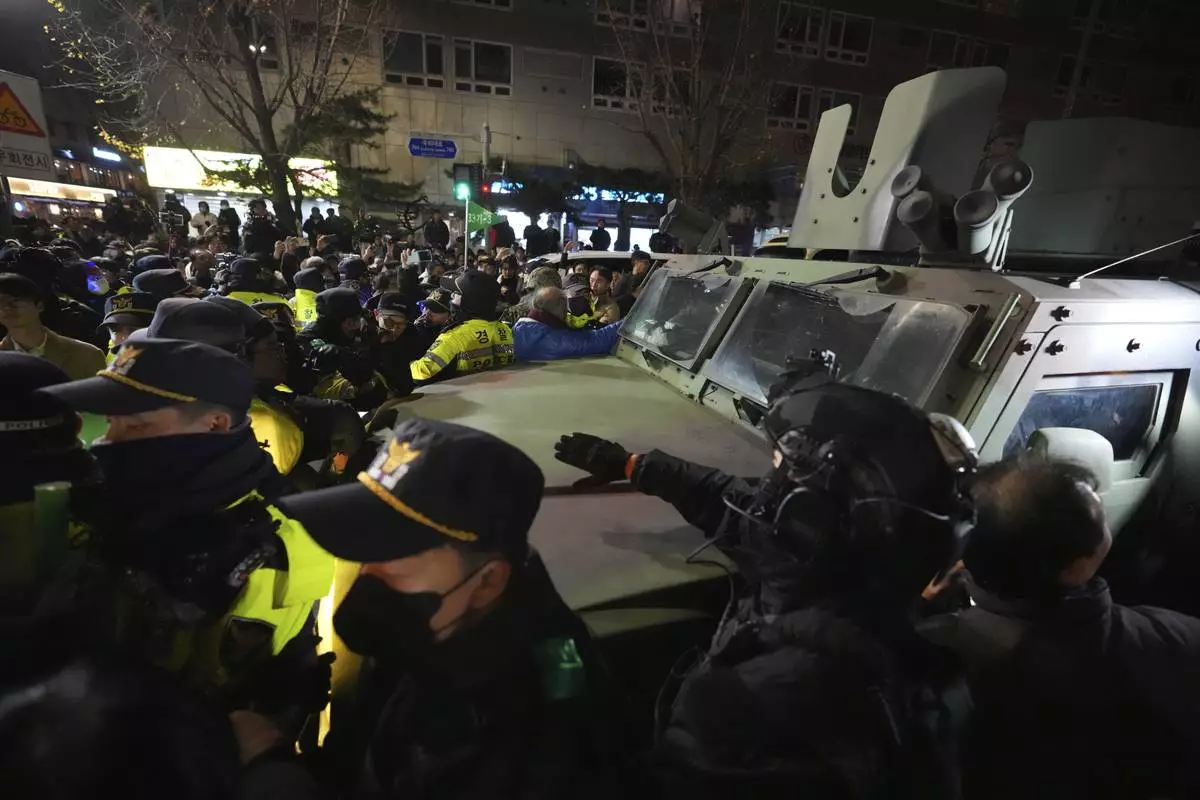
Military vehicle is escorted by police officers as people try to block outside of the National Assembly in Seoul, South Korea, Wednesday, Dec. 4, 2024. (AP Photo/Lee Jin-man)
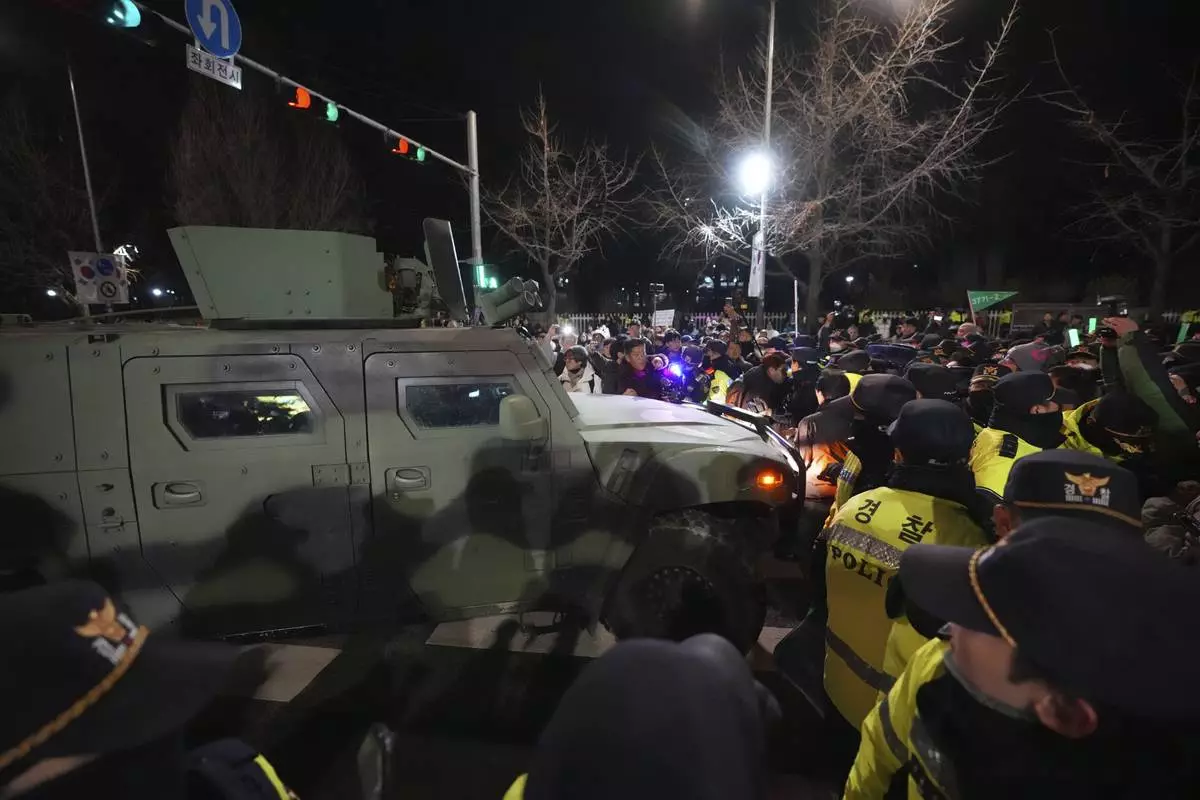
Military vehicle is escorted by police officers as people try to block outside of the National Assembly in Seoul, South Korea, Wednesday, Dec. 4, 2024. (AP Photo/Lee Jin-man)
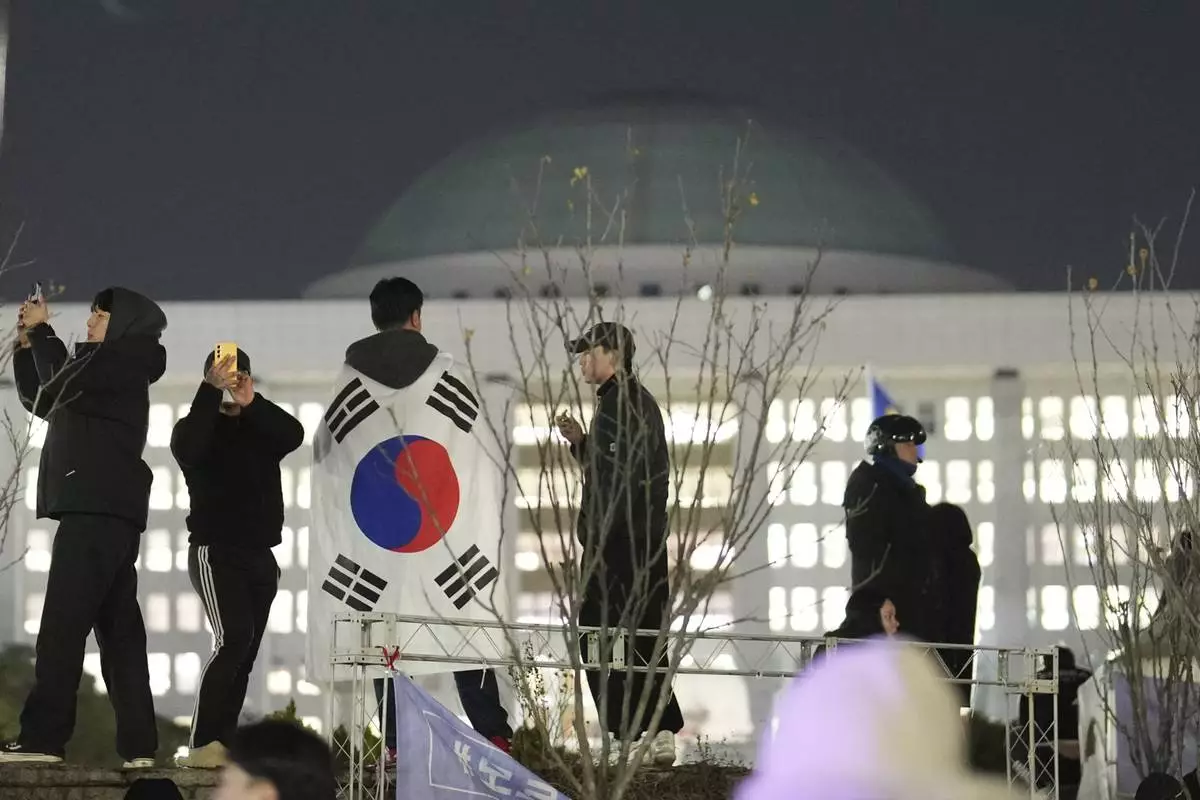
A man wearing a national flag stands on the wall of the National Assembly in Seoul, South Korea, Wednesday, Dec. 4, 2024. (AP Photo/Lee Jin-man)
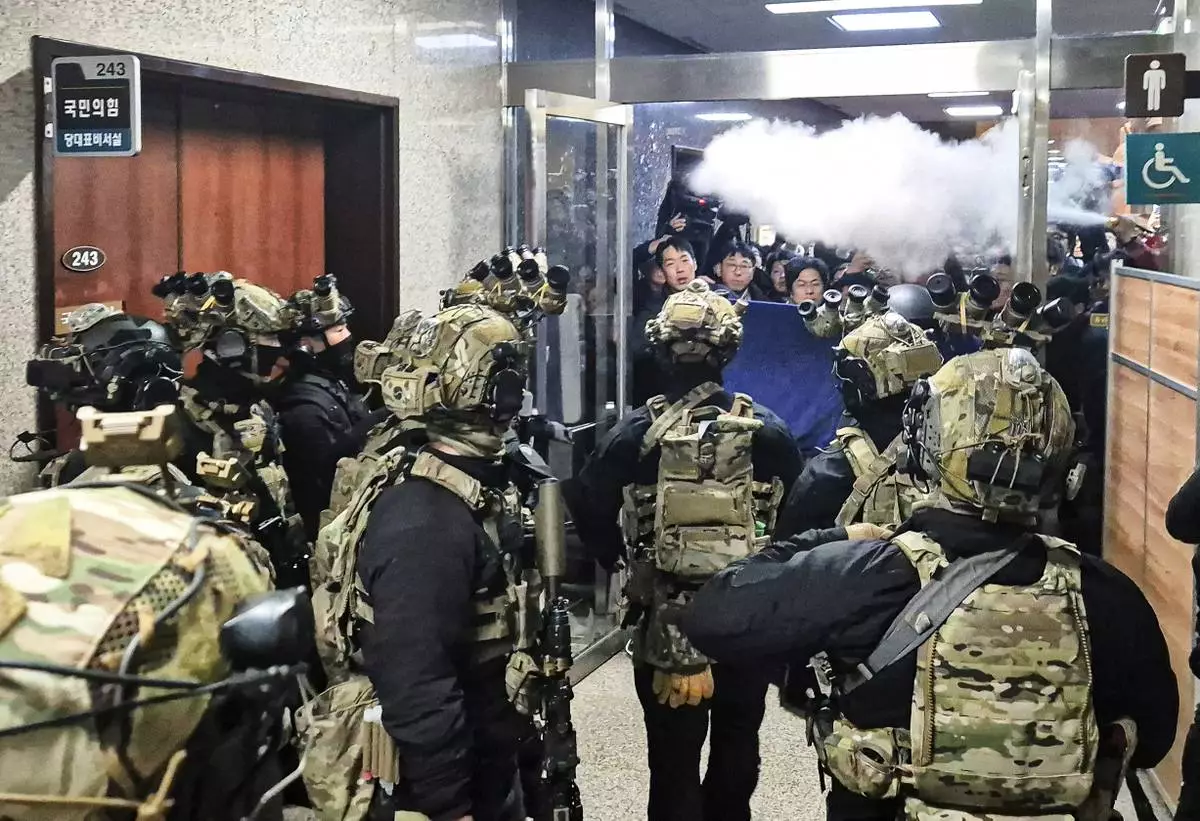
A National Assembly staff sprays fire extinguishers to block soldiers entering the main hall of the National Assembly in Seoul, South Korea, Wednesday, Dec. 4, 2024. (Jo Da-un/Yonhap via AP)
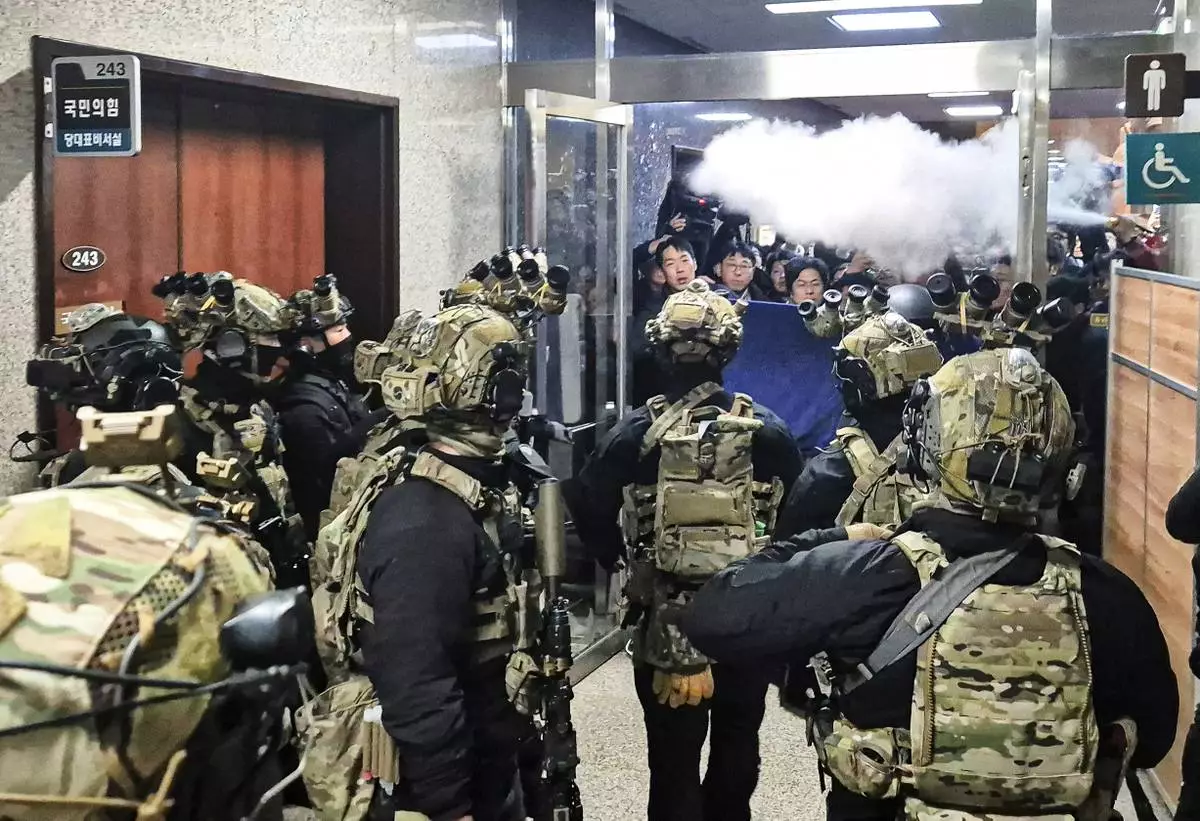
A National Assembly staff sprays fire extinguishers to block soldiers entering the main hall of the National Assembly in Seoul, South Korea, Wednesday, Dec. 4, 2024. (Jo Da-un/Yonhap via AP)
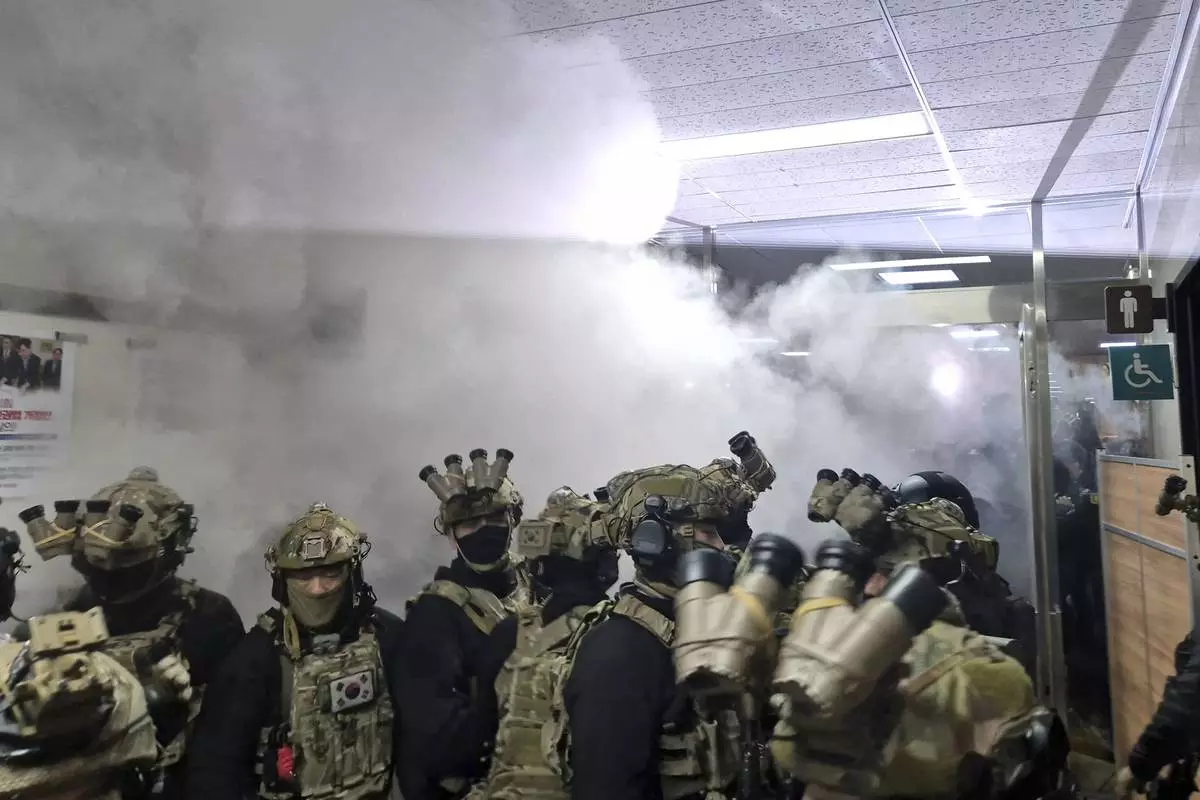
A National Assembly staff sprays fire extinguishers to block soldiers entering the main hall of the National Assembly in Seoul, South Korea, Wednesday, Dec. 4, 2024. (Jo Da-un/Yonhap via AP)
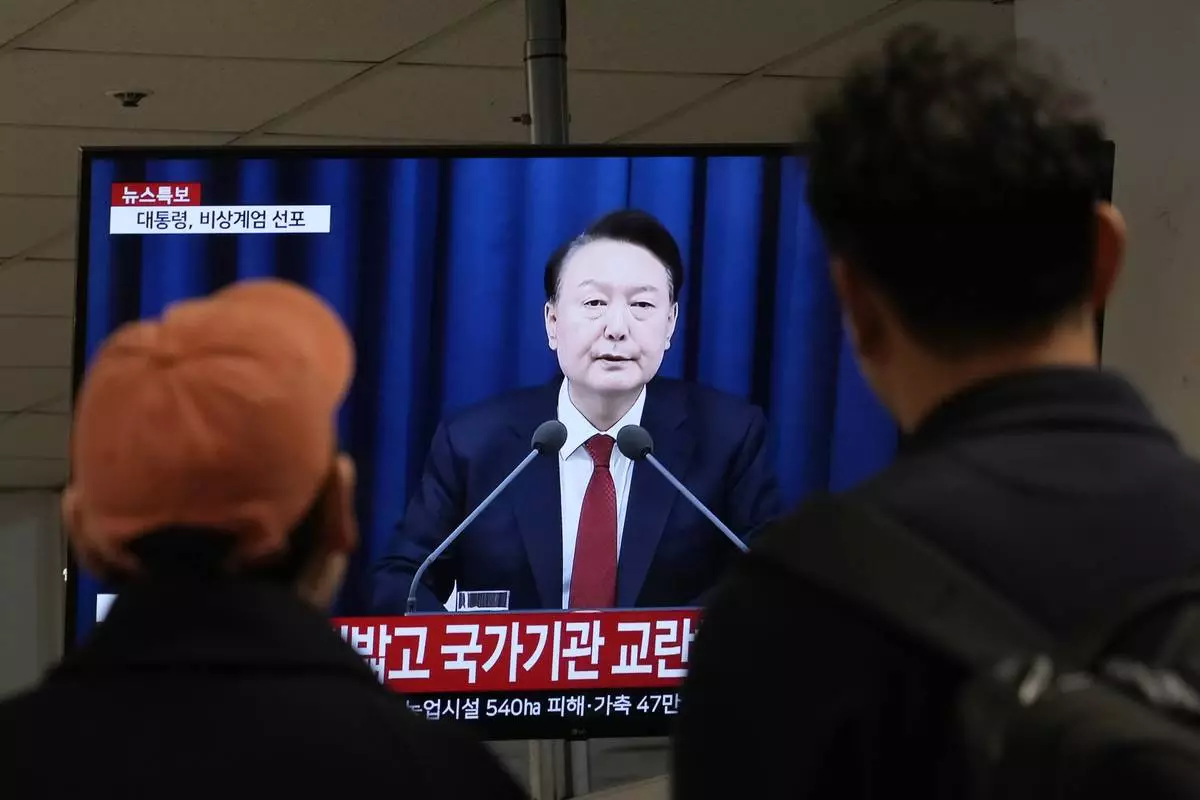
People watch a TV screen showing South Korean President Yoon Suk Yeol's televised briefing at a bus terminal in Seoul, South Korea, Tuesday, Dec. 3, 2024. (AP Photo/Ahn Young-joon)
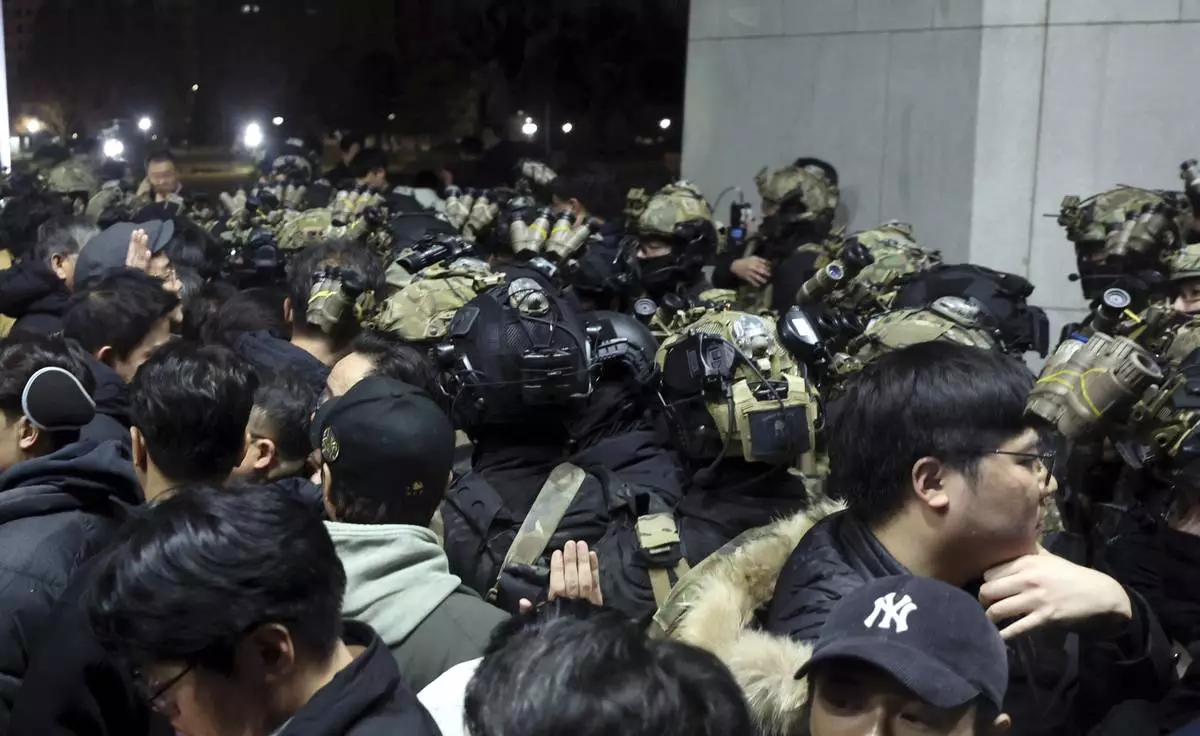
South Korean martial law soldiers try to enter the National Assembly compound in Seoul, South Korea, Wednesday, Dec. 4, 2024. (Cho Sung-bong/Newsis via AP)
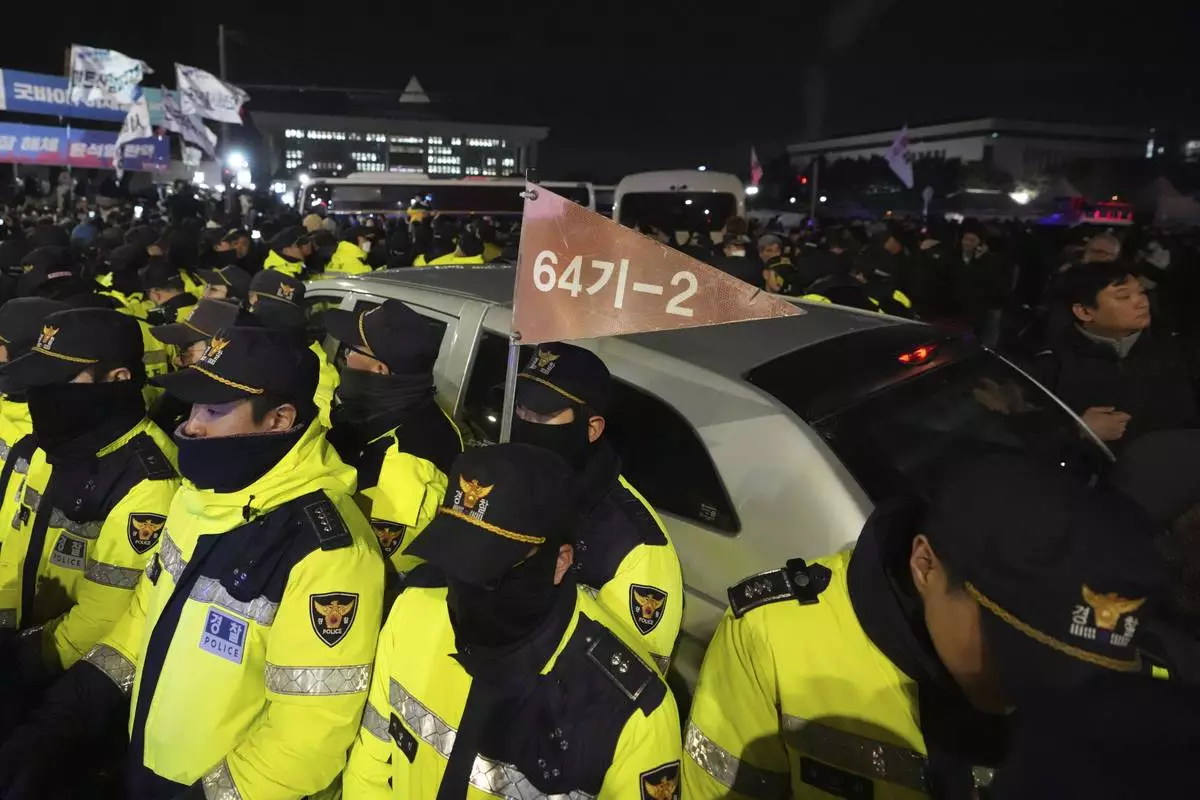
Police officers stand outside the National Assembly in Seoul, South Korea, Wednesday, Dec. 4, 2024. (AP Photo/Lee Jin-man)
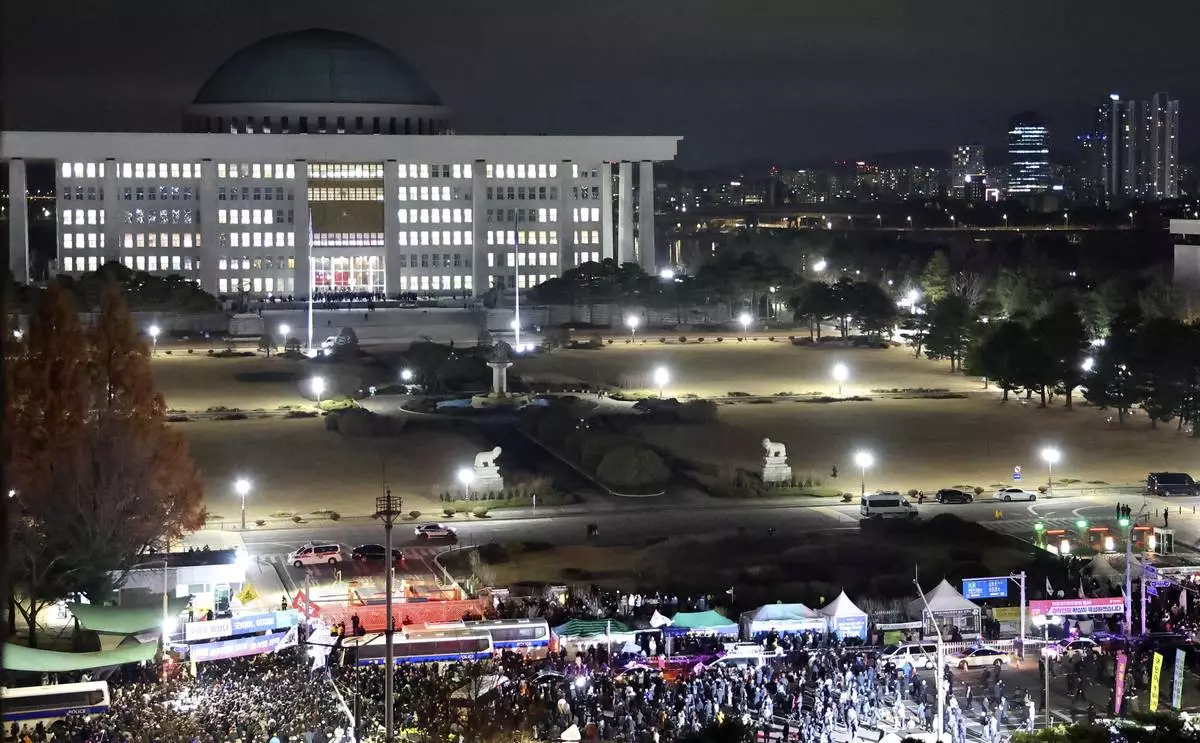
People gather to demand South Korean President Yoon Suk Yeol to step down in front of the National Assembly in Seoul, South Korea, Wednesday, Dec. 4, 2024. (Kim Do-hoon/Yonhap via AP)
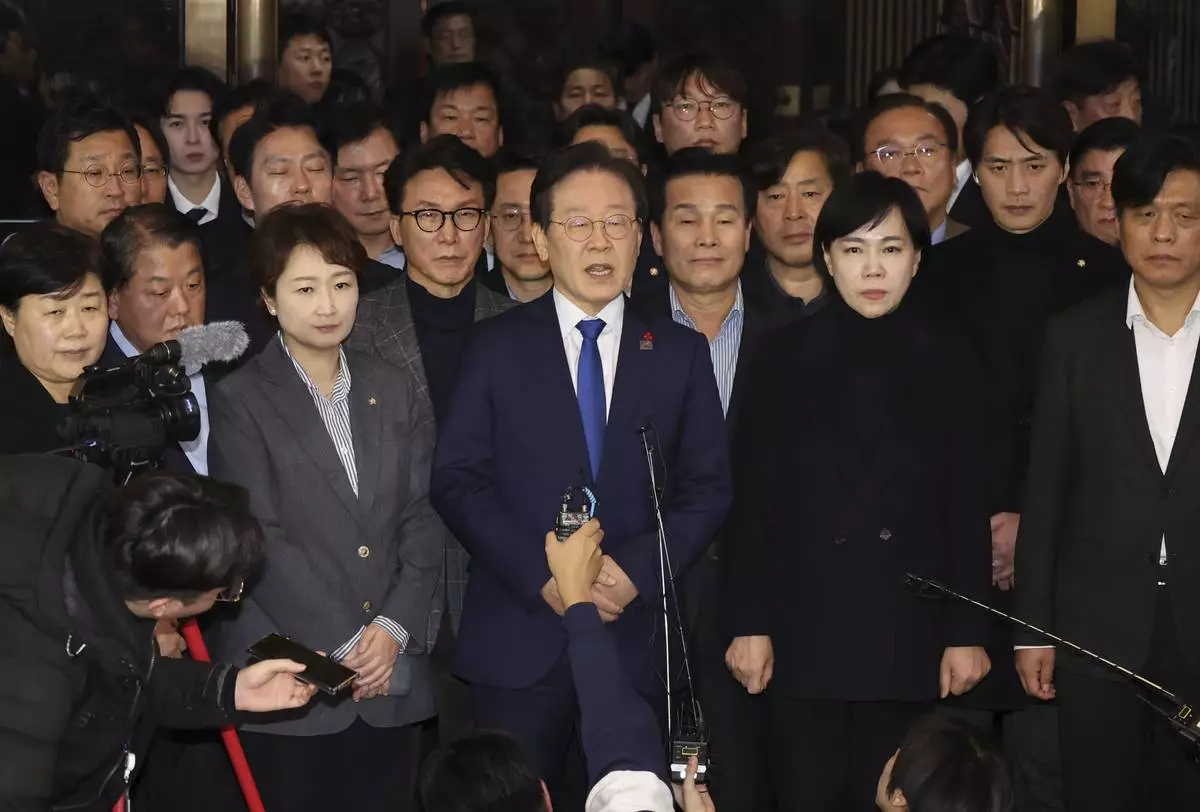
South Korea's main opposition Democratic Party leader Lee Jae-myung, center, speaks at the National Assembly in Seoul, South Korea, Wednesday, Dec. 4, 2024. (Kim Ju-hyung/Yonhap via AP)
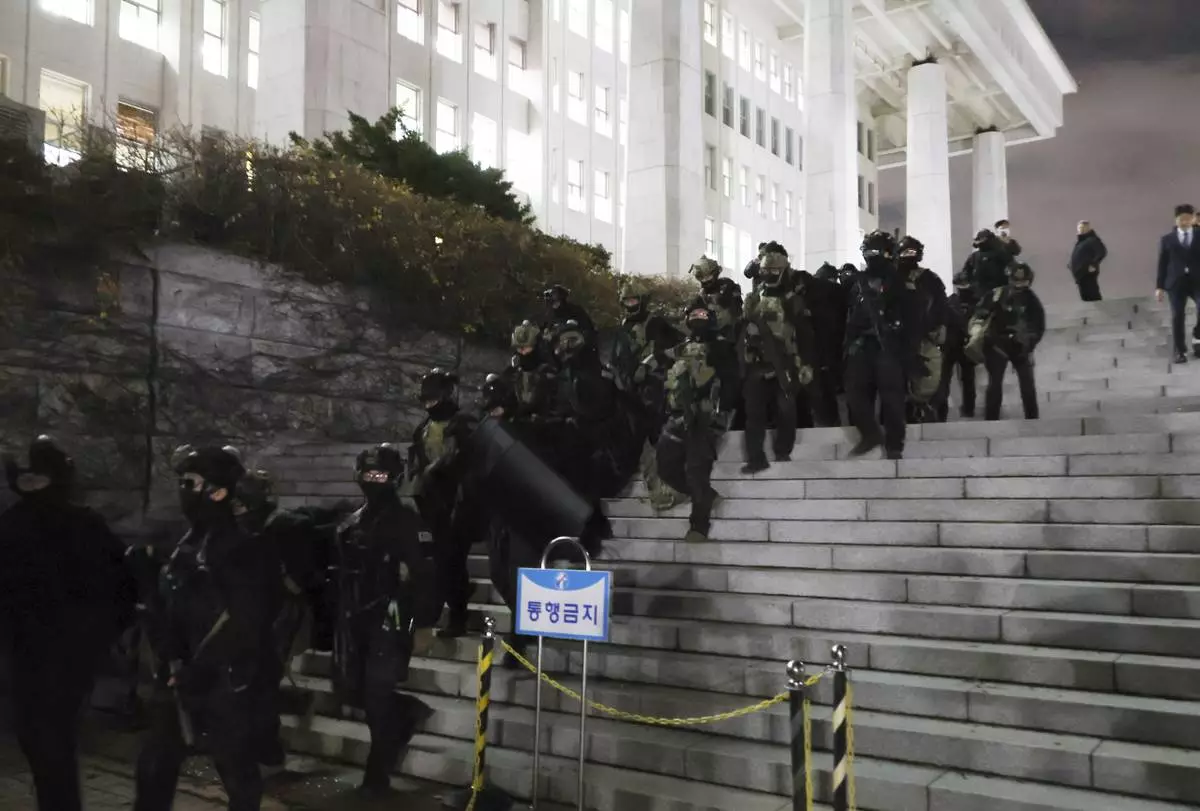
South Korean martial law soldiers leave the National Assembly in Seoul, South Korea, Wednesday, Dec. 4, 2024. (Kim Ju-sung/Yonhap via AP)
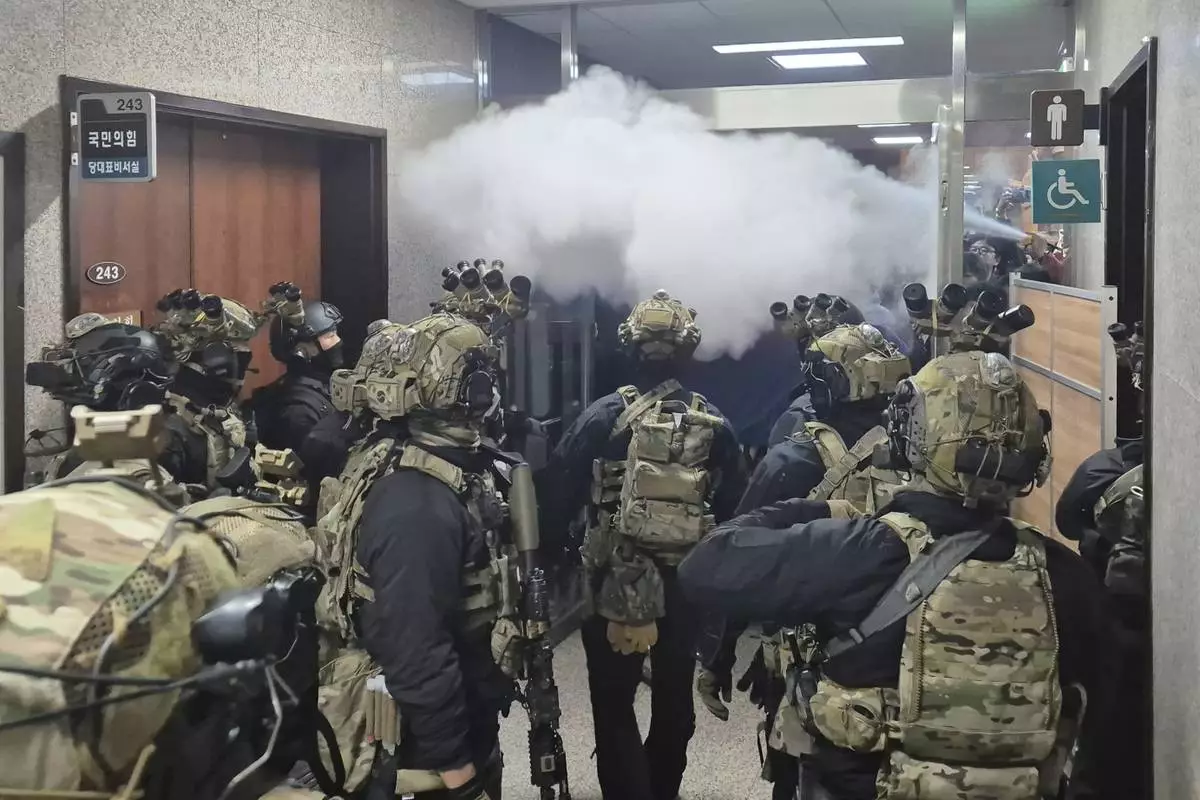
National Assembly employees spray a fire extinguisher towards soldiers at the National Assembly in Seoul, South Korea, Wednesday, Dec. 4, 2024. (Cho Da-un/Yonhap via AP)




